Special Report
The Hardest College to Get Into in Every State
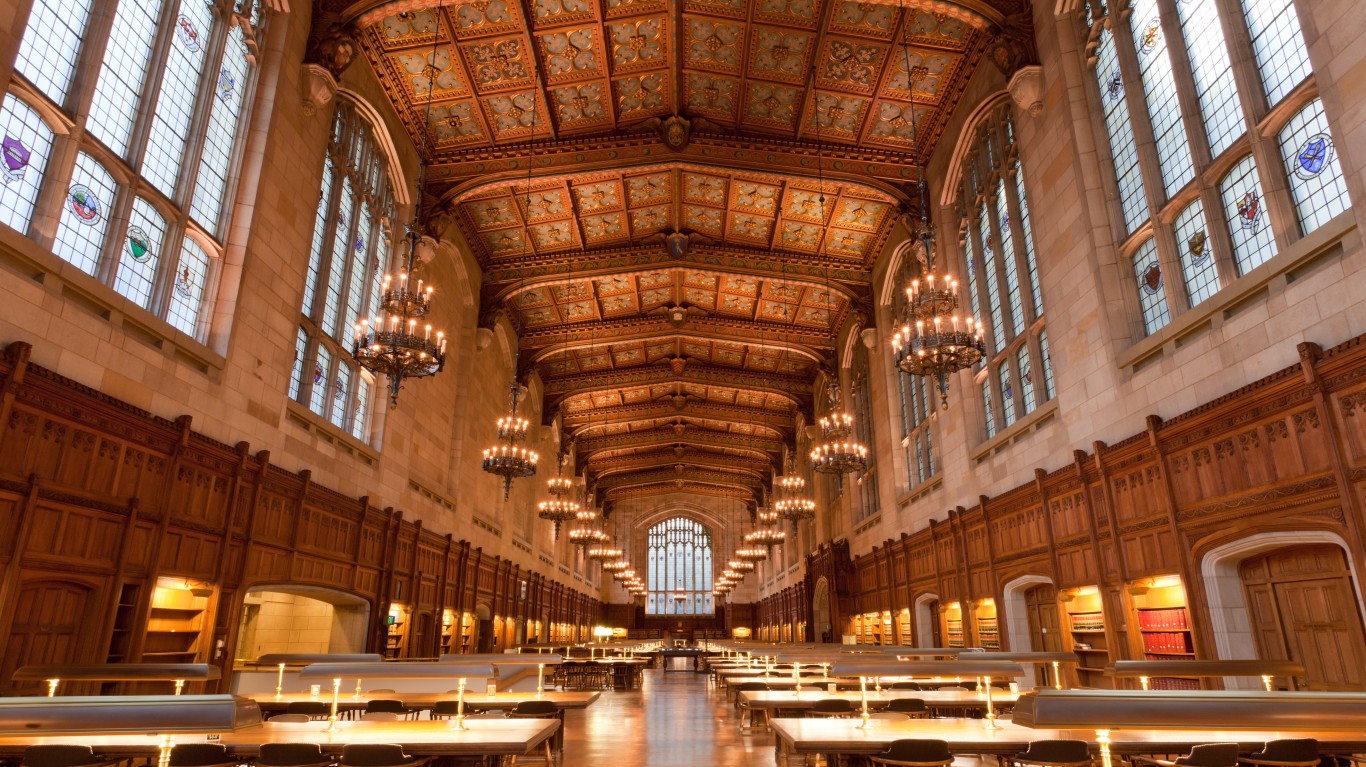
Published:
Last Updated:

The majority of colleges and universities in the United States accept most of the students who apply each year. However, there are institutions that are very selective, admitting a small share of those who apply.
24/7 Wall St. reviewed admissions data across thousands of four-year, degree-granting institutions from the National Center for Education Statistics to determine each state’s most selective college. Our index was based on admission rates as well as SAT scores of admitted students to measure the difficulty of being accepted to those universities and colleges.
Of the hardest colleges to get into in each state, 11 admit fewer than one out of 10 applicants. Not surprisingly, the most selective schools in seven states are the Ivy League colleges of Yale, Harvard, Dartmouth, Princeton, Columbia, Pennsylvania, and Brown. Harvard accepted fewer than one in 20 of the applicants for the 2018-19 school year. These colleges leverage their prestige and academic reputation to attract students from around the world and are able to charge a premium for attending the schools. These are the most expensive colleges in each state.
In some states, admission rates for even the most selective school exceed 50%. The University of Wyoming is the only four-year university in Wyoming and has an acceptance rate of 96%. In these schools, SAT test scores for admitted students also tend to be lower.
The size of the school does not necessarily correlate to selectivity. Six of the schools on the list have undergraduate populations of more than 30,000, while five have fewer than 1,000 undergrads, such as Bethel College, one of several religiously affiliated schools on the list. Prowess in athletics has helped boost the selectivity of such well-known colleges as Notre Dame, Duke, Alabama, Michigan, and Clemson. Here are the most valuable college football teams.
The most highly selective institutions by state appear to deserve their high number of applicants, at least based on the income potential of their graduates. A dozen have annual median earnings 10 years after matriculation in excess of $70,000. These are the most affordable colleges with the best outcomes in every state.
Click here to see the hardest colleges to get into by state.
Click here to read our methodology.
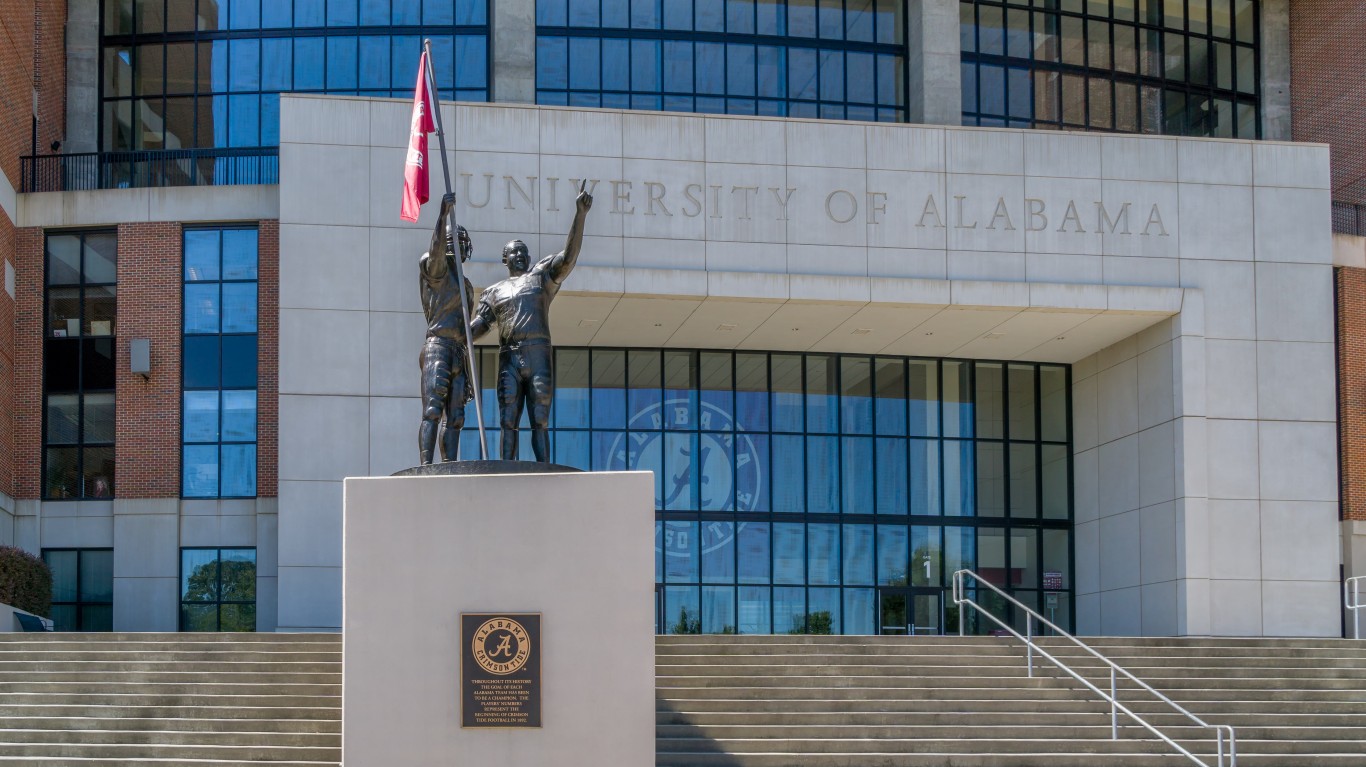
Alabama: The University of Alabama
> Location: Tuscaloosa
> Acceptance rate for 2018-2019: 59.1%
> Applicants for 2018-2019: 37,302
> Median SAT score: 1170 out of 1600
> Avg. annual cost of attendance: $29,424
> Four-year undergraduate enrollment, fall 2018: 32,177
The University of Alabama football team has won 17 national championships, and current coach Nick Saban has won five national titles with the Crimson Tide. The college opened in 1831 and is the oldest public university in Alabama.
[in-text-ad]
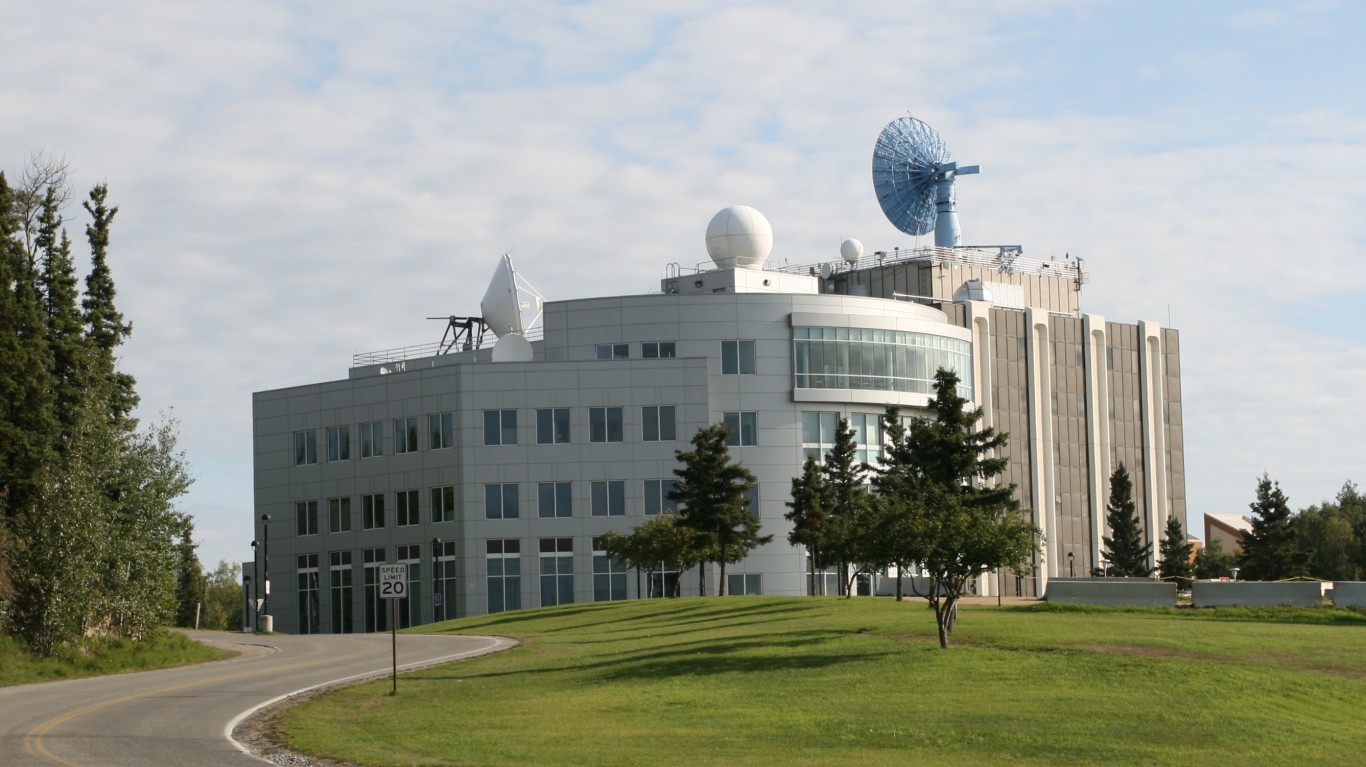
Alaska: University of Alaska Fairbanks
> Location: Fairbanks
> Acceptance rate for 2018-2019: 76.1%
> Applicants for 2018-2019: 1,683
> Median SAT score: 1160 out of 1600
> Avg. annual cost of attendance: $18,510
> Four-year undergraduate enrollment, fall 2018: 4,657
The University of Alaska Fairbanks, the northernmost institution of higher learning on the list, is known for documenting and preserving 20 Indian, Aleut, and Eskimo languages through its Alaska Native Language Center.
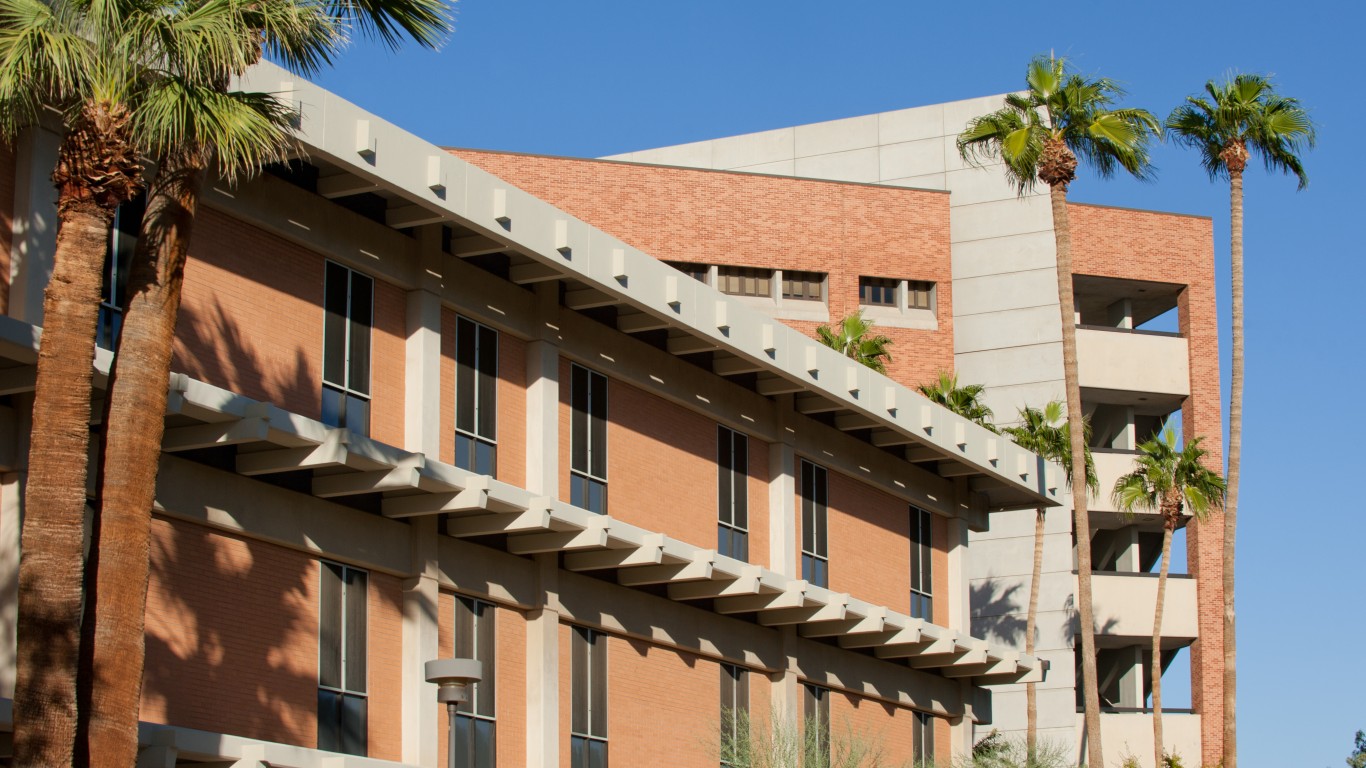
Arizona: Arizona State University-Tempe
> Location: Tempe
> Acceptance rate for 2018-2019: 84.8%
> Applicants for 2018-2019: 26,869
> Median SAT score: 1245 out of 1600
> Avg. annual cost of attendance: $25,621
> Four-year undergraduate enrollment, fall 2018: 42,529
Arizona State University collaborates with NASA, with students and faculty working with the space agency through the Space Grant Scholar program. The school is also known for its journalism, business, and engineering programs.
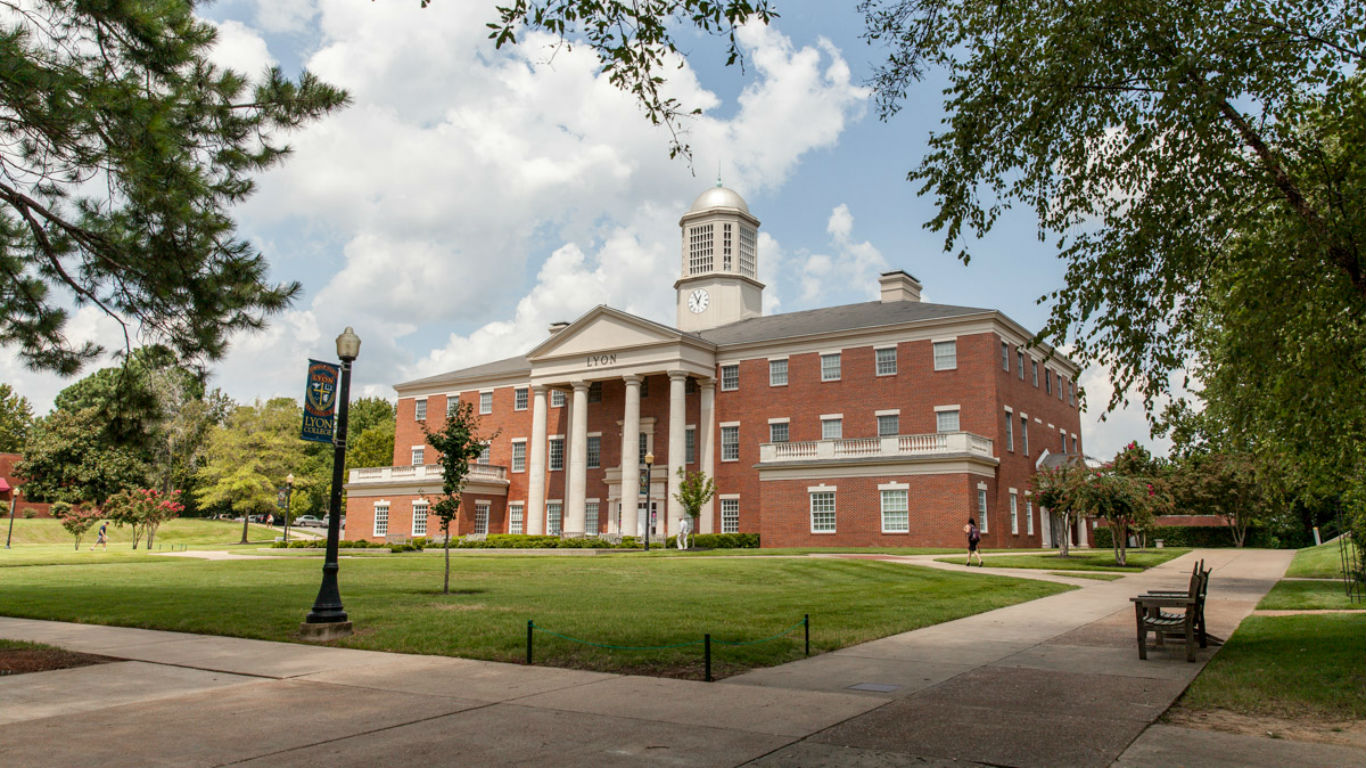
Arkansas: Lyon College
> Location: Batesville
> Acceptance rate for 2018-2019: 49.9%
> Applicants for 2018-2019: 1,741
> Median SAT score: 1114 out of 1600
> Avg. annual cost of attendance: $38,173
> Four-year undergraduate enrollment, fall 2018: 655
Lyon College is a small liberal arts institution located in Batesville, Arkansas, in the foothills of the Ozark Mountains. The school, which opened in 1872, is closely associated with the Presbyterian Church and holds Scottish-themed festivals and events in acknowledgment of its Scottish heritage.
[in-text-ad-2]
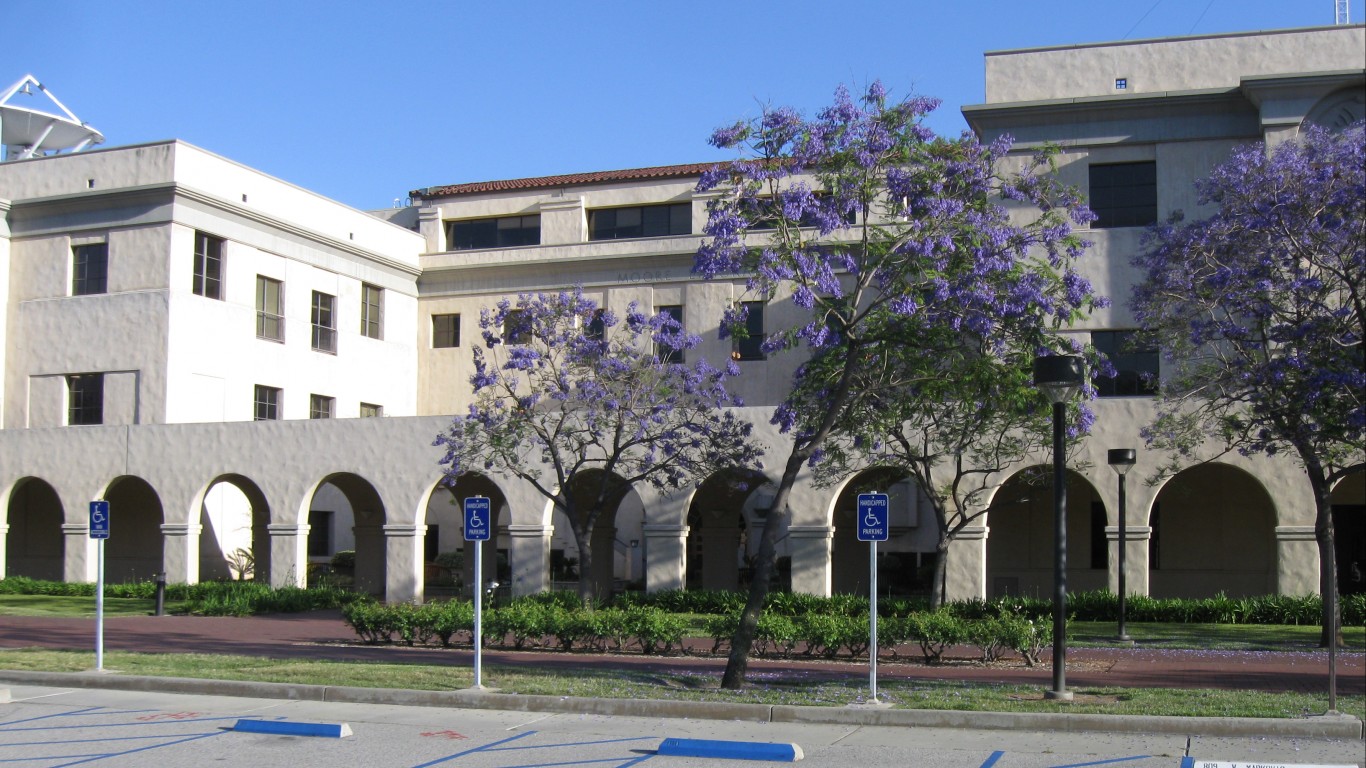
California: California Institute of Technology
> Location: Pasadena
> Acceptance rate for 2018-2019: 6.6%
> Applicants for 2018-2019: 8,208
> Median SAT score: 1555 out of 1600
> Avg. annual cost of attendance: $68,901
> Four-year undergraduate enrollment, fall 2018: 948
The California Institute of Technology is known the world over for its science and engineering research. Alumni and faculty from the institution have been awarded 39 Nobel Prizes. Among them two-time winner Linus Pauling.
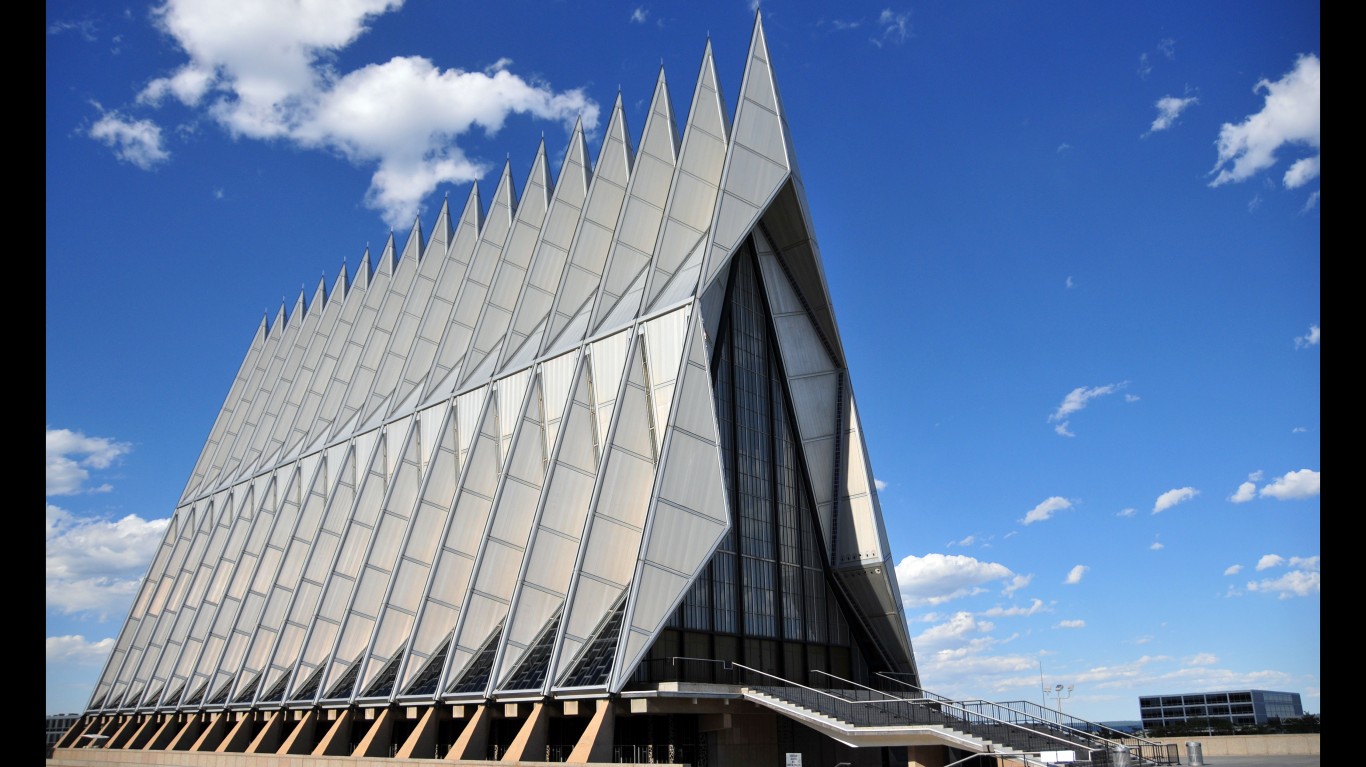
Colorado: United States Air Force Academy
> Location: Air Force Academy
> Acceptance rate for 2018-2019: 11.4%
> Applicants for 2018-2019: 10,376
> Median SAT score: 1320 out of 1600
> Avg. annual cost of attendance: N/A
> Four-year undergraduate enrollment, fall 2018: 4,336
The United States Air Force Academy opened its doors in 1954 in the Colorado Springs metro area after the government weighed 580 proposed sites in 45 states. Lt. Gen. Susan Helms, who graduated from the academy in 1980, has flown on five space shuttle missions.
[in-text-ad]
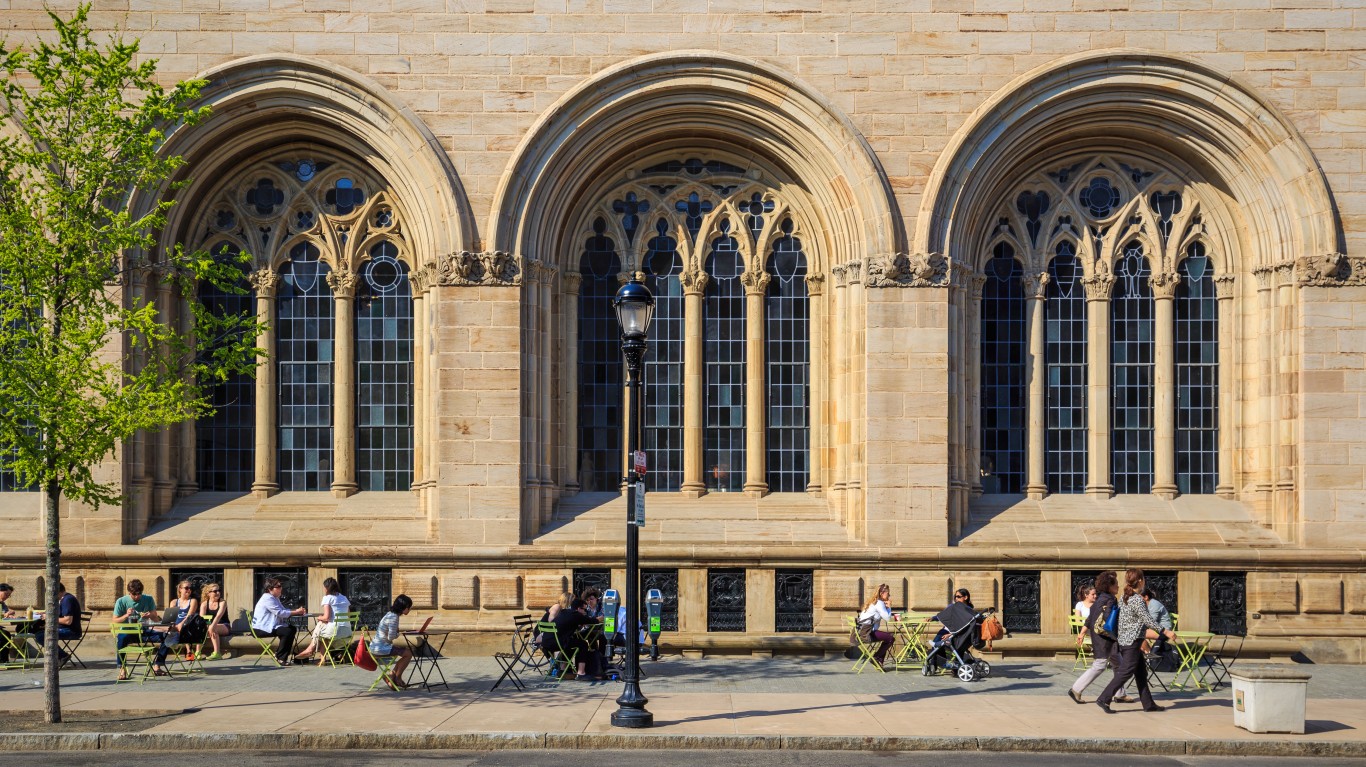
Connecticut: Yale University
> Location: New Haven
> Acceptance rate for 2018-2019: 6.3%
> Applicants for 2018-2019: 35,301
> Median SAT score: 1515 out of 1600
> Avg. annual cost of attendance: $71,290
> Four-year undergraduate enrollment, fall 2018: 5,963
Yale University was founded in 1701, the fourth-oldest college in the United States. Among its myriad distinctions is its long association with China, a relationship that dates from 1835. Students of the Ivy League university boast about its many student organizations, including singing, dancing, theater, and even juggling groups. Oscar-winning actors Meryl Streep and Jodie Foster, former Secretary of State Hillary Clinton, and former presidents Bill Clinton and George W. Bush are among Yale alumni.
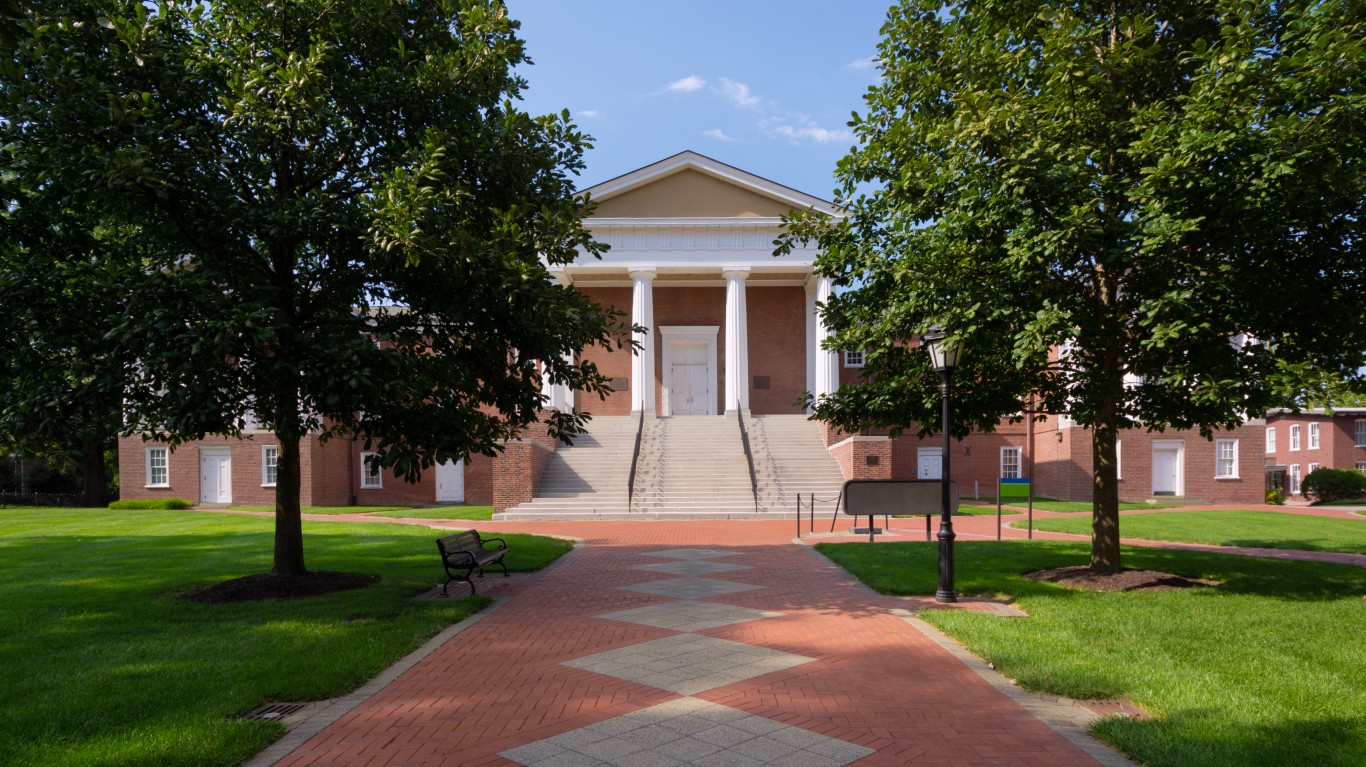
Delaware: University of Delaware
> Location: Newark
> Acceptance rate for 2018-2019: 66.4%
> Applicants for 2018-2019: 27,691
> Median SAT score: 1255 out of 1600
> Avg. annual cost of attendance: $25,584
> Four-year undergraduate enrollment, fall 2018: 19,060
The University of Delaware, founded in 1743, is the largest university in America’s first state. Among its more notable alumni are former Vice President Joe Biden, former New Jersey Gov. Chris Christie, and actor Yvette Freeman.
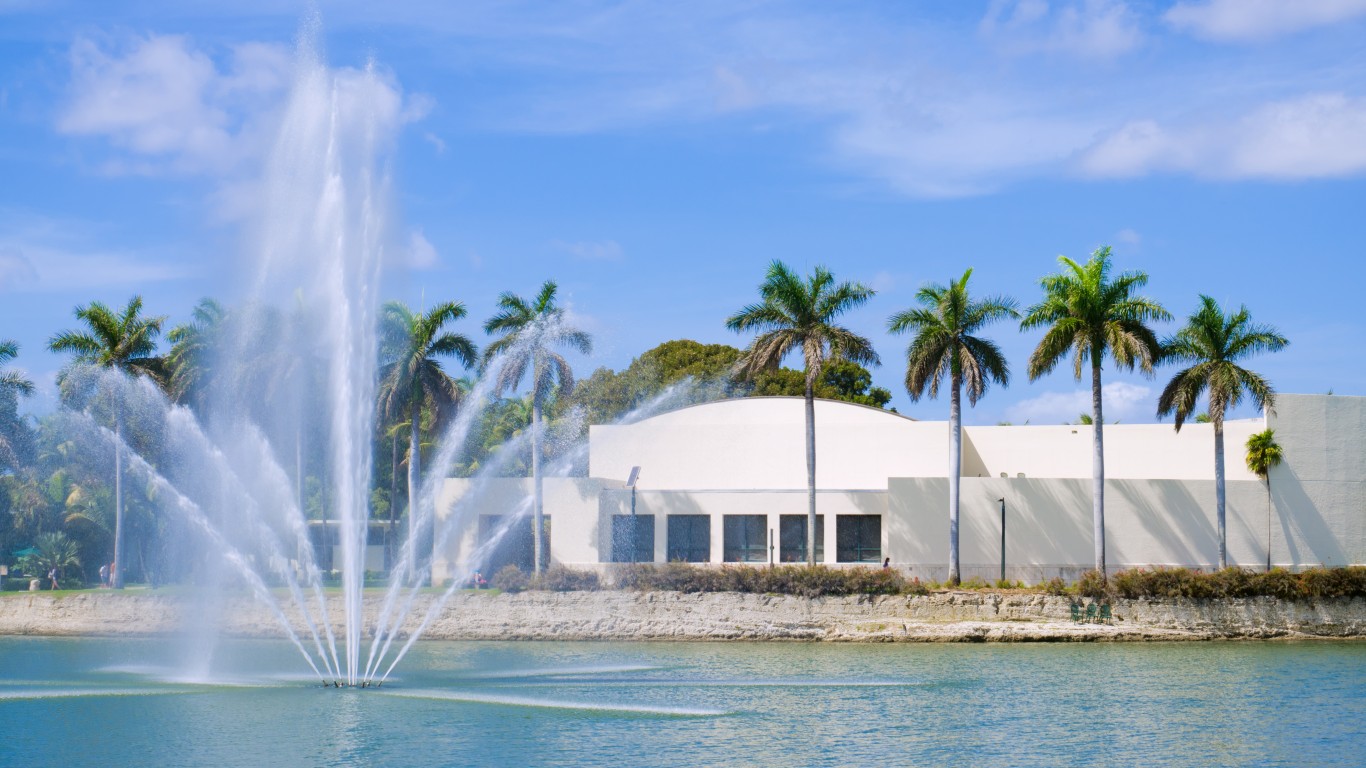
Florida: University of Miami
> Location: Coral Gables
> Acceptance rate for 2018-2019: 32.1%
> Applicants for 2018-2019: 34,281
> Median SAT score: 1340 out of 1600
> Avg. annual cost of attendance: $65,298
> Four-year undergraduate enrollment, fall 2018: 10,873
University of Miami is famous for its campus — considered to be one of the most beautiful in the nation. Although the school has made its mark in college football by winning five national championships, it is also known for its programs in the sciences, engineering, and music.
[in-text-ad-2]
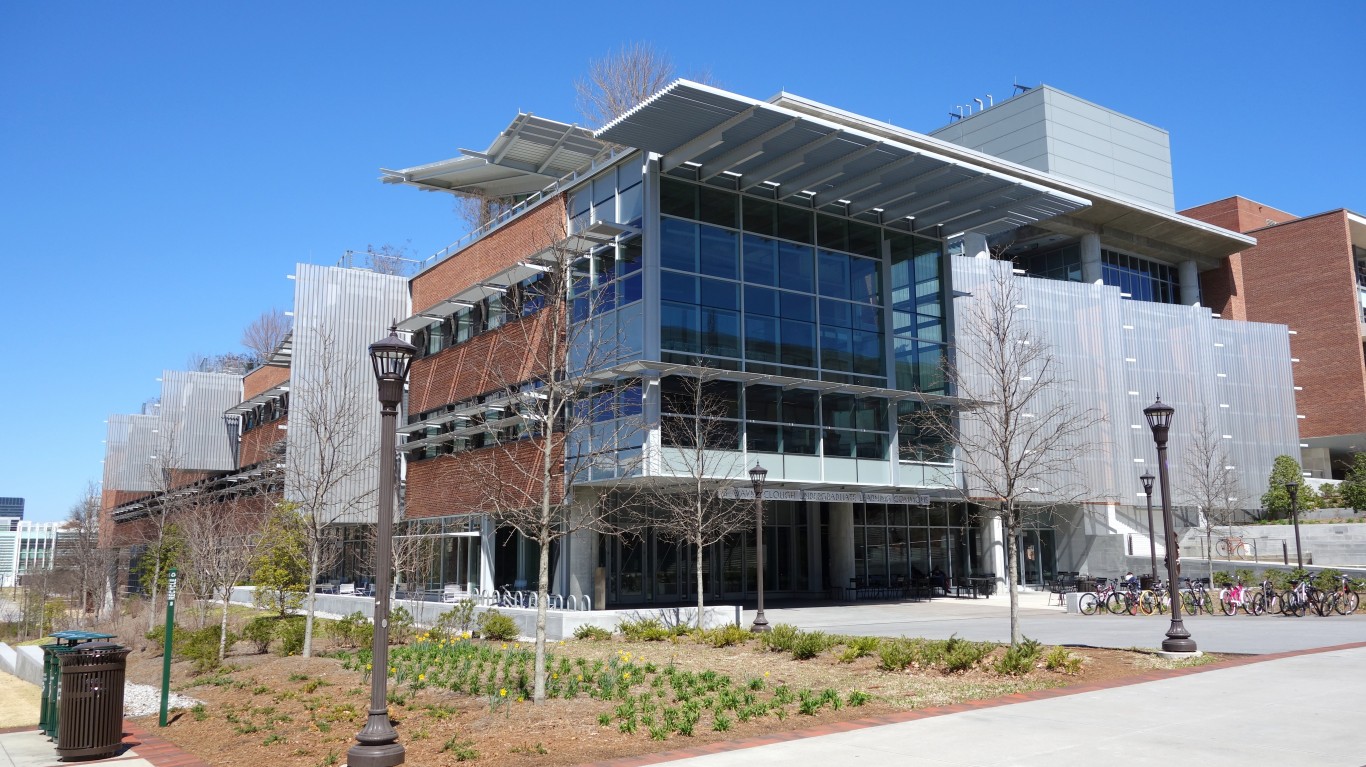
Georgia: Georgia Institute of Technology-Main Campus
> Location: Atlanta
> Acceptance rate for 2018-2019: 21.5%
> Applicants for 2018-2019: 35,644
> Median SAT score: 1465 out of 1600
> Avg. annual cost of attendance: $28,501
> Four-year undergraduate enrollment, fall 2018: 15,201
The Georgia Institute of Technology is a world-renowned public research institution founded in Atlanta in 1885. Alumnus Kary Mullis won the Nobel Prize in Chemistry in 1993. Though the workload at Georgia Tech is intense, students are able to follow Division I sports such as football and basketball as a diversion, and the Atlanta location affords them a variety of activities. The school also has campuses in Metz, France and Shenzhen, China.
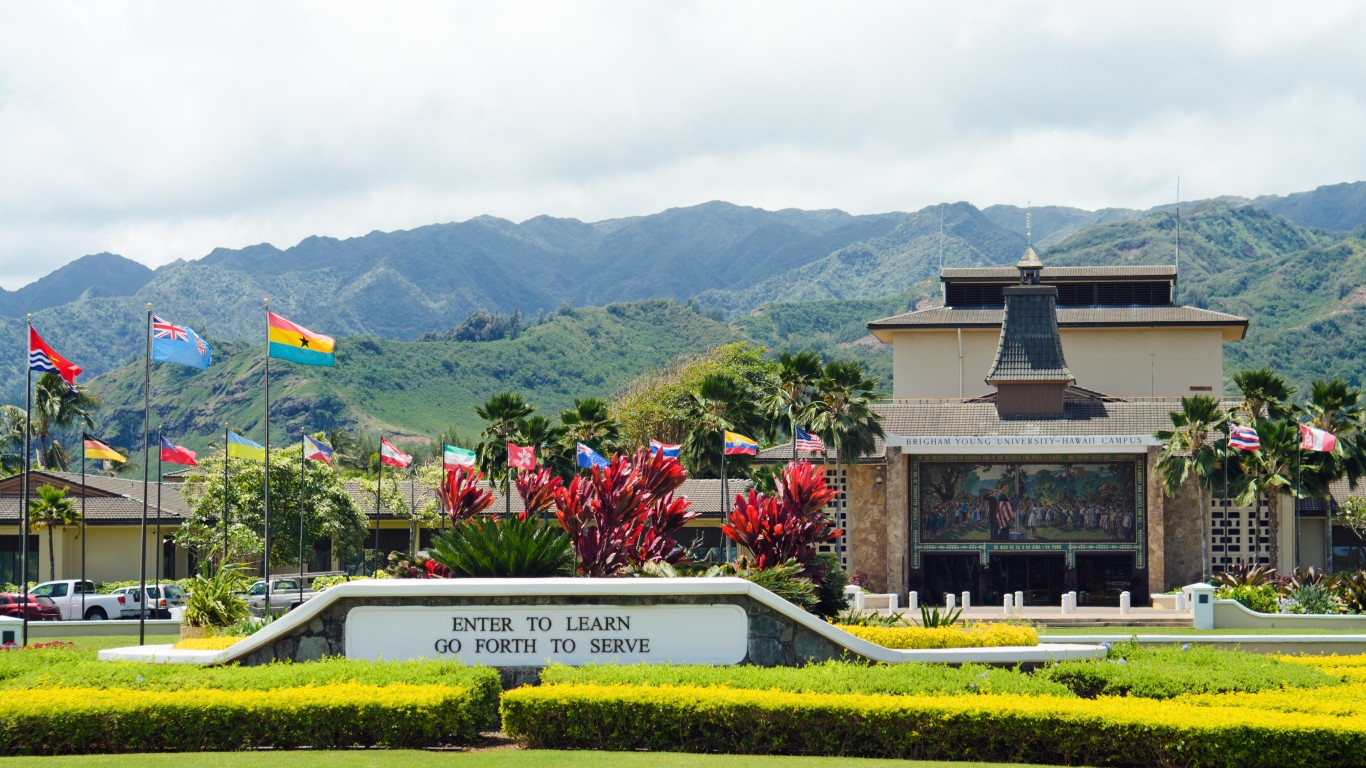
Hawaii: Brigham Young University-Hawaii
> Location: Laie
> Acceptance rate for 2018-2019: 44.8%
> Applicants for 2018-2019: 2,970
> Median SAT score: 1167 out of 1600
> Avg. annual cost of attendance: $18,043
> Four-year undergraduate enrollment, fall 2018: 3,040
BYU-Hawaii first opened its doors in 1955, approximately 110 years after a group of Latter-day Saint missionaries first landed in Hawaii. In the 2018-19 school year BYU-Hawaii accepted just 44.8% of applicants, the lowest acceptance rate of any school in Hawaii with available data. The median SAT score among first-year students was 1167 out of 1600, the highest such median of any college or university in the state.
[in-text-ad]
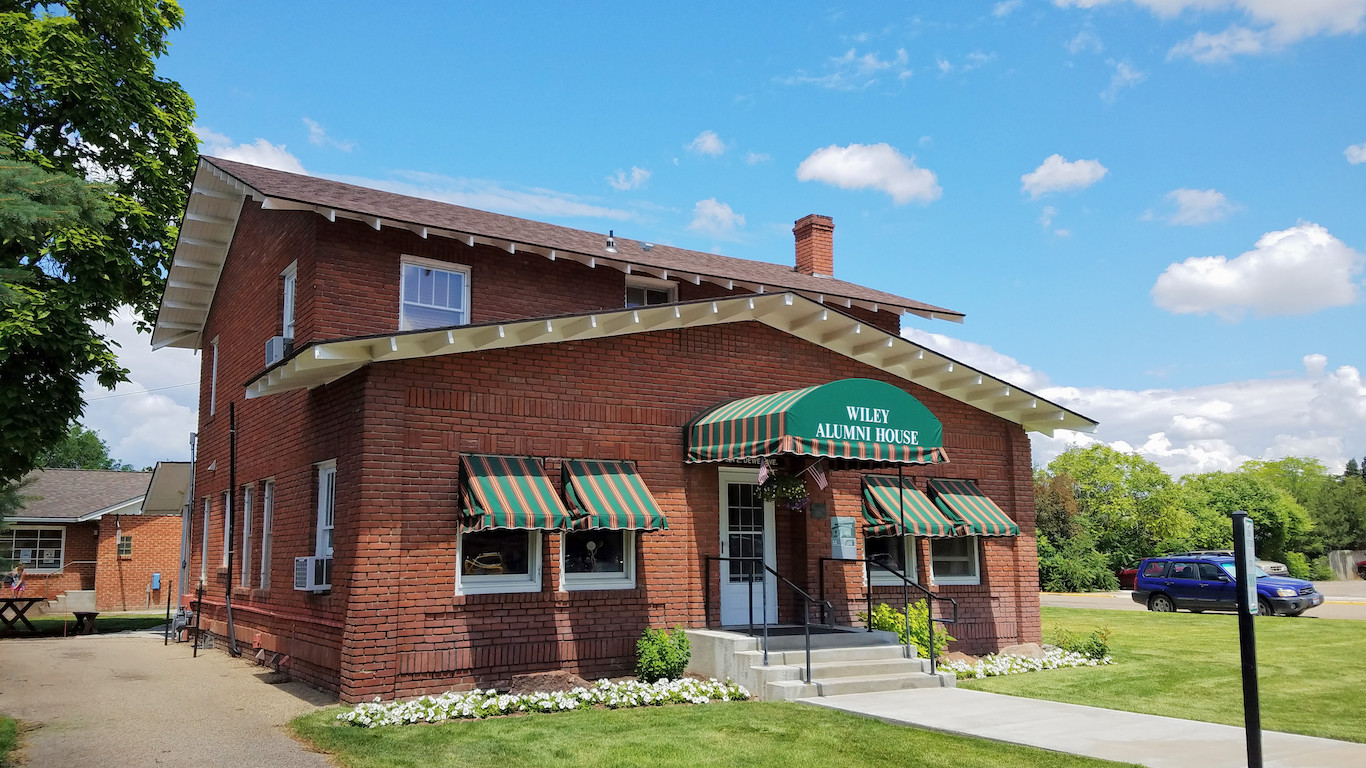
Idaho: Northwest Nazarene University
> Location: Nampa
> Acceptance rate for 2018-2019: 70.9%
> Applicants for 2018-2019: 1,046
> Median SAT score: 1135 out of 1600
> Avg. annual cost of attendance: $38,842
> Four-year undergraduate enrollment, fall 2018: 1,268
Northwest Nazarene University is a small liberal arts college founded in 1913 in Nampa, Idaho, about 20 miles west of Boise. Popular majors at the school today include business administration, nursing, and teaching.

Illinois: University of Chicago
> Location: Chicago
> Acceptance rate for 2018-2019: 7.3%
> Applicants for 2018-2019: 32,283
> Median SAT score: 1520 out of 1600
> Avg. annual cost of attendance: $75,735
> Four-year undergraduate enrollment, fall 2018: 6,600
The University of Chicago is well-known for its academic rigor, particularly in the area of economics, and for faculty doing ground-breaking research. The institution boasts a handful of Nobel Prize winners — Saul Bellow-literature, George E. Smith-physics — and Pulitzer Prize recipients — Bret Stephens-commentary, Roger Ebert-criticism. Before he was president, Barack Obama taught at the University of Chicago Law School.
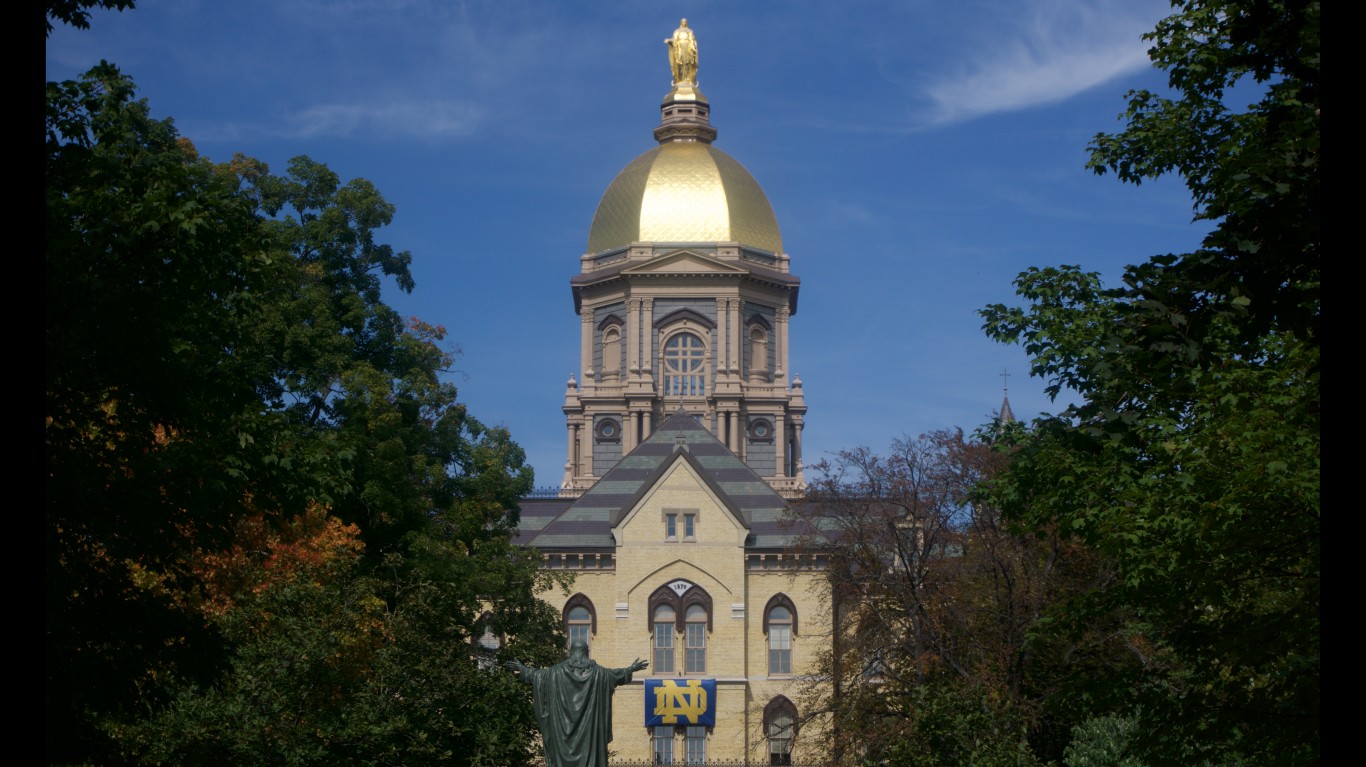
Indiana: University of Notre Dame
> Location: Notre Dame
> Acceptance rate for 2018-2019: 17.7%
> Applicants for 2018-2019: 20,371
> Median SAT score: 1475 out of 1600
> Avg. annual cost of attendance: $69,395
> Four-year undergraduate enrollment, fall 2018: 8,568
Few American universities can boast a football legacy as rich as that of Notre Dame, a private Catholic research university founded in 1842. According to the NCAA, the school has 22 national football championships by major selectors, tied with the University of Alabama for the most of any Division I school. Notre Dame is also one of the most selective schools in the country. In the 2018-19 school year Notre Dame accepted just 17.7% of applicants, the lowest acceptance rate in Indiana and among the lowest of any school nationwide.
[in-text-ad-2]
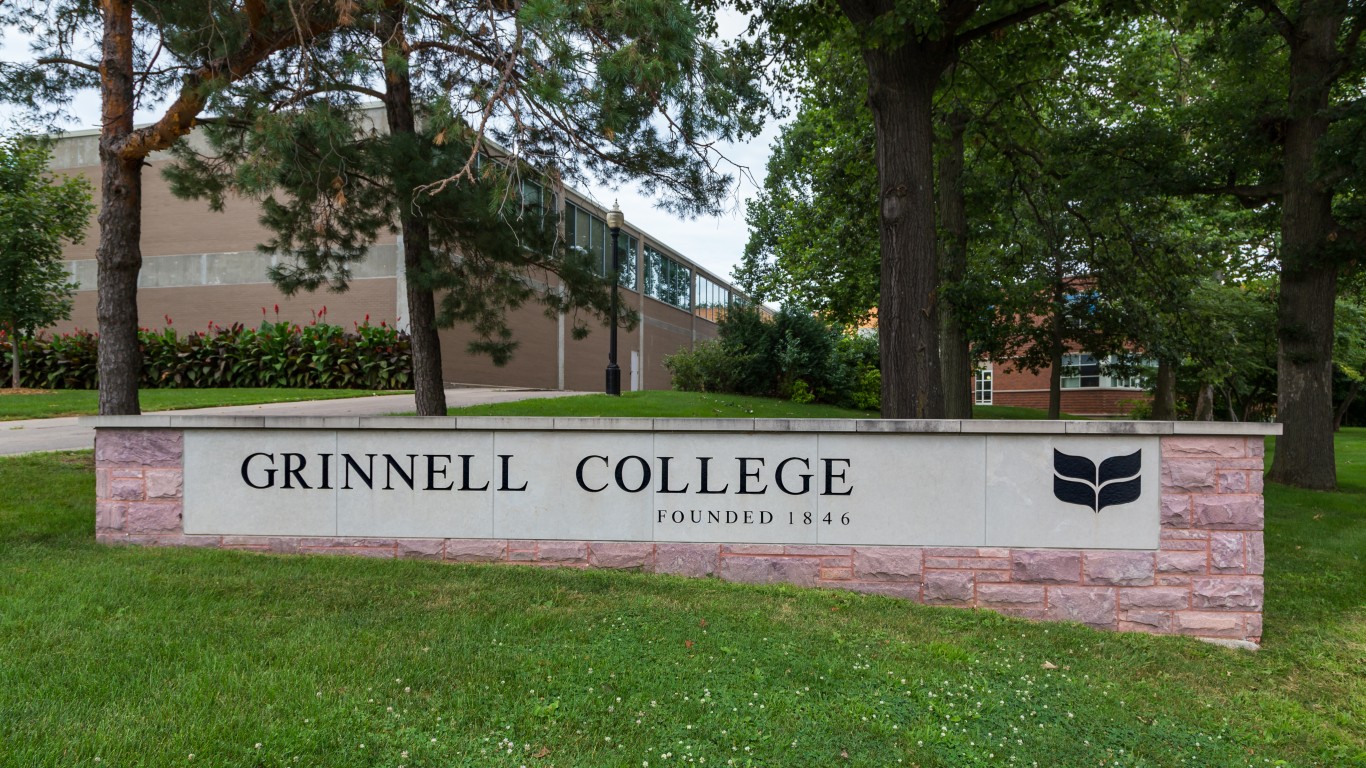
Iowa: Grinnell College
> Location: Grinnell
> Acceptance rate for 2018-2019: 24.4%
> Applicants for 2018-2019: 7,349
> Median SAT score: 1451 out of 1600
> Avg. annual cost of attendance: $65,814
> Four-year undergraduate enrollment, fall 2018: 1,683
Grinnell College, a small private liberal arts school in Grinnell, Iowa, describes itself as “quirky” and “curious.” The Midwestern school was founded in 1846, and its theme is commitment to the common good.
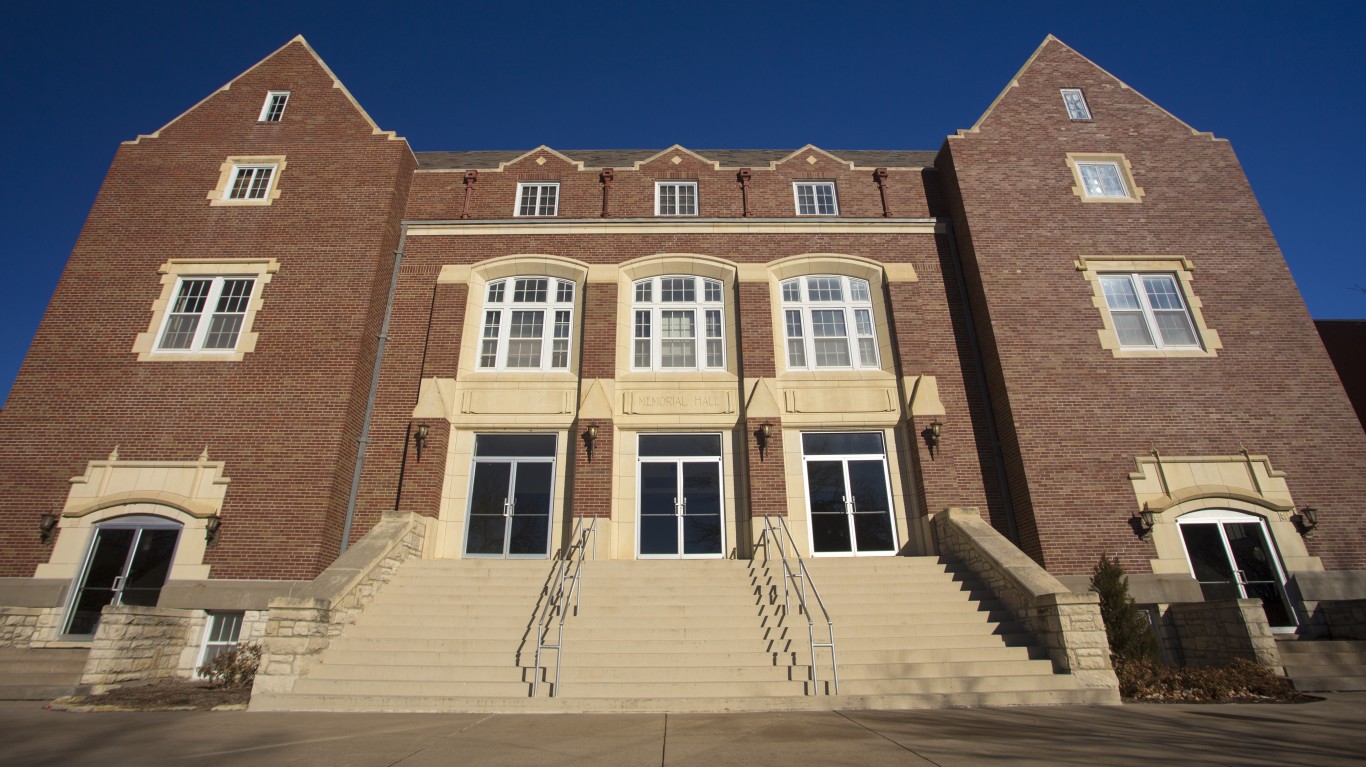
Kansas: Bethel College-North Newton
> Location: North Newton
> Acceptance rate for 2018-2019: 44.1%
> Applicants for 2018-2019: 1,093
> Median SAT score: 1035 out of 1600
> Avg. annual cost of attendance: $41,204
> Four-year undergraduate enrollment, fall 2018: 442
Located in the center of Kansas, Bethel College in North Newton was the first Mennonite college founded in North America in 1887. It was established in the tradition of progressive Christian liberal arts values and the school says it tries to prepare its students to become critical thinkers and global citizens. With just 442 undergraduates, it is the smallest school on the list.
[in-text-ad]
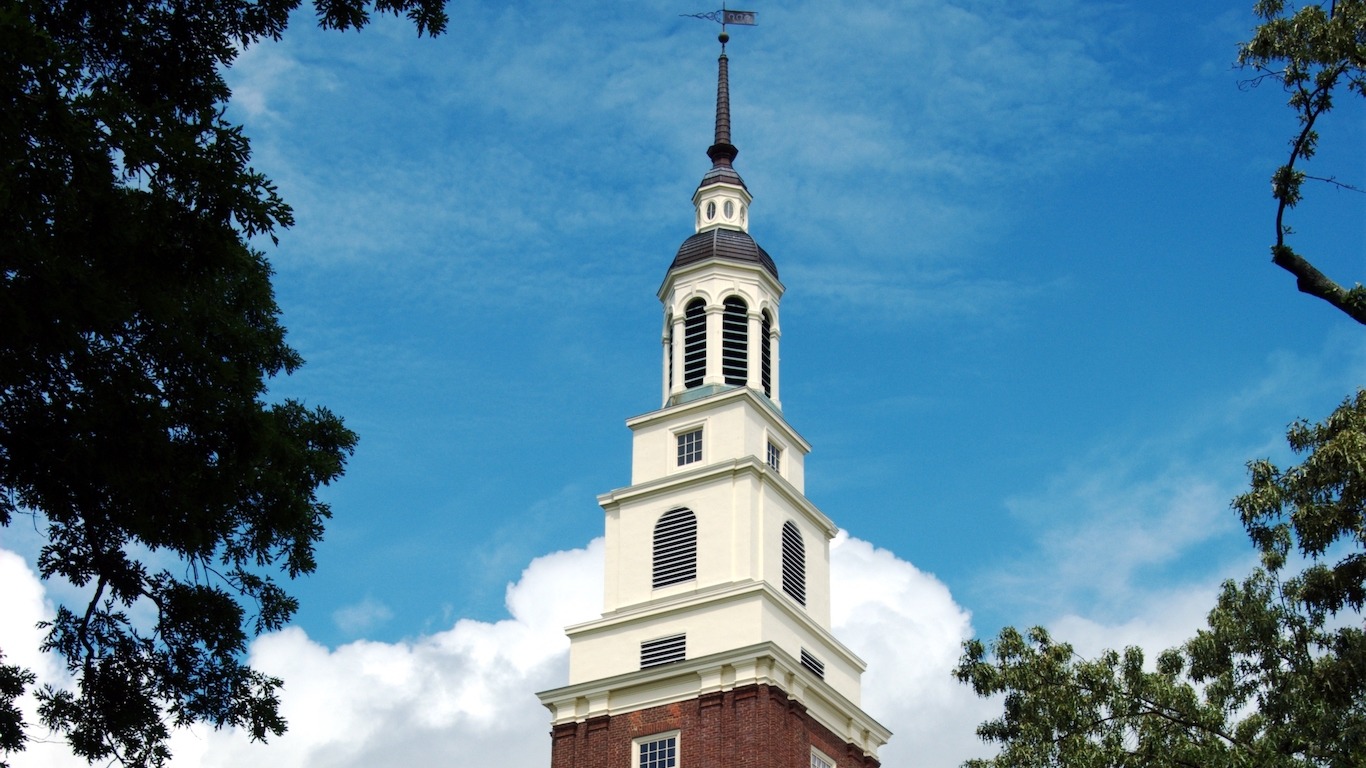
Kentucky: Berea College
> Location: Berea
> Acceptance rate for 2018-2019: 38.2%
> Applicants for 2018-2019: 1,576
> Median SAT score: 1122 out of 1600
> Avg. annual cost of attendance: $35,394
> Four-year undergraduate enrollment, fall 2018: 1,630
Founded in 1855 and deeply rooted in Appalachian history and culture, Berea College was the first interracial and coeducational college in the South. It is also tuition-free, relying on endowment income, gifts, and financial aid. All students must work at least 10 hours a week in jobs on campus and in the community.
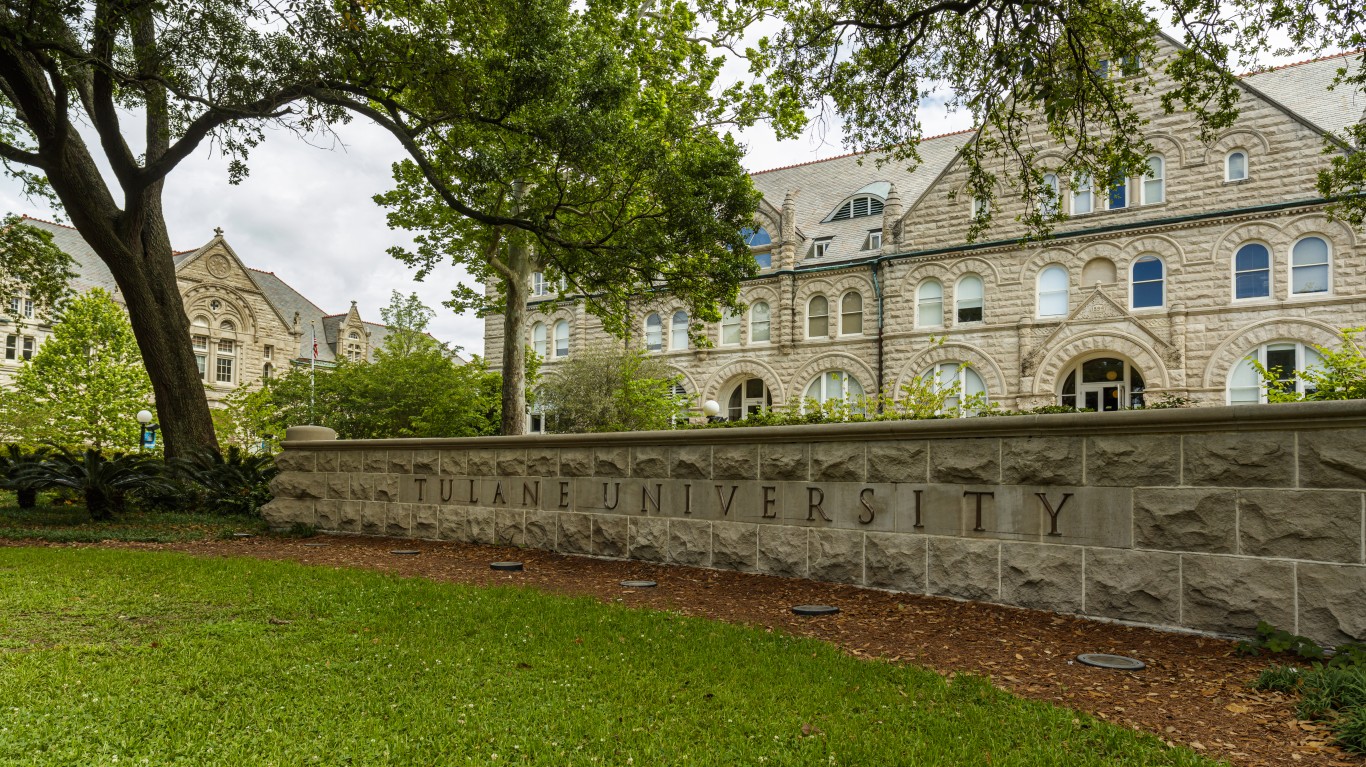
Louisiana: Tulane University of Louisiana
> Location: New Orleans
> Acceptance rate for 2018-2019: 17.3%
> Applicants for 2018-2019: 38,816
> Median SAT score: 1420 out of 1600
> Avg. annual cost of attendance: $69,517
> Four-year undergraduate enrollment, fall 2018: 7,920
Tulane University in New Orleans was founded as a medical college in 1834 to train doctors to treat diseases such as yellow fever, malaria, and smallpox that were ravaging the port city. Tropical medicine remains one of the degrees offered at Tulane, along with architecture, business, law, liberal arts, the sciences, engineering, and social work.
Maine: Colby College
> Location: Waterville
> Acceptance rate for 2018-2019: 13.1%
> Applicants for 2018-2019: 12,313
> Median SAT score: 1430 out of 1600
> Avg. annual cost of attendance: $68,582
> Four-year undergraduate enrollment, fall 2018: 2,000
Colby College, a private liberal arts institution founded in 1813, is located in Waterville, Maine, about 20 miles north of the state capital of Augusta. Like most relatively selective schools, Colby College is relatively expensive — the typical cost of attending the school is approximately $68,582. Of other degree-granting institutions in the state, only Bates has a higher sticker price.
[in-text-ad-2]
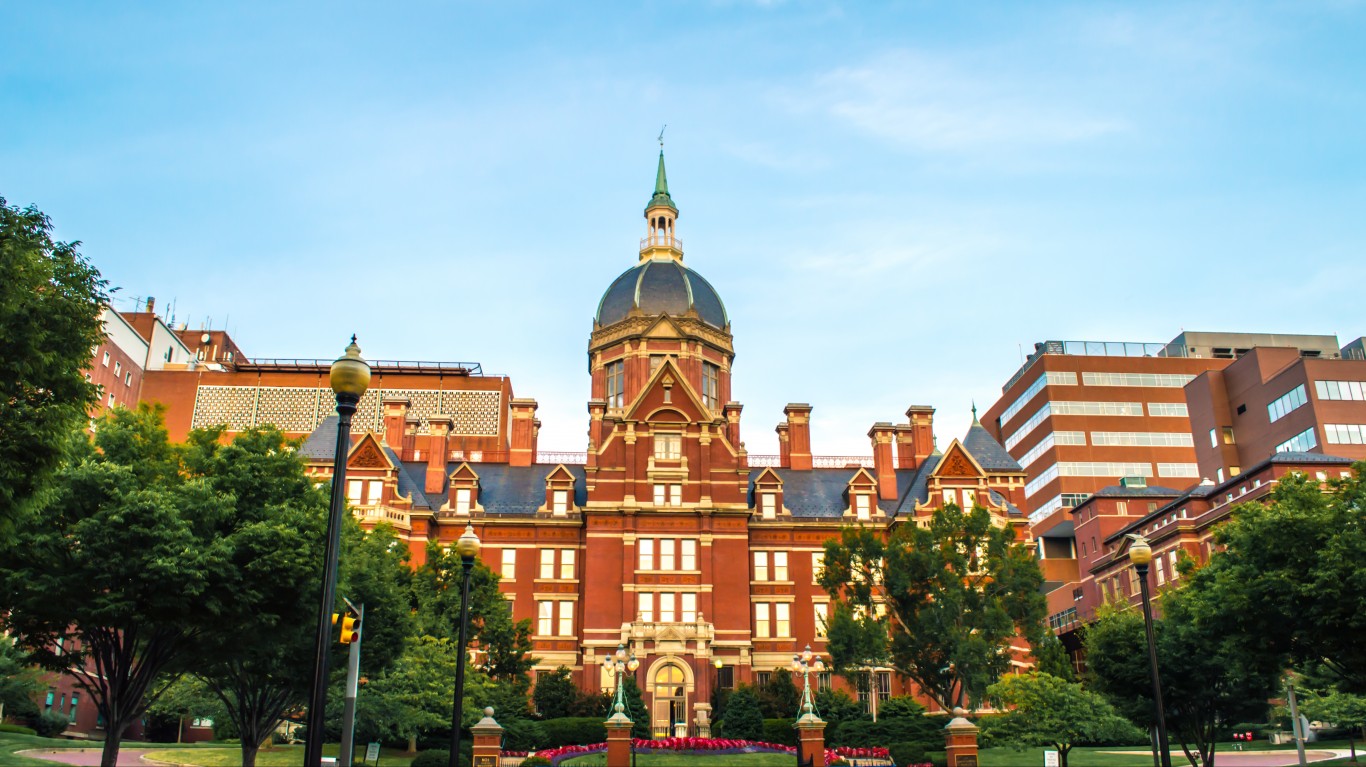
Maryland: Johns Hopkins University
> Location: Baltimore
> Acceptance rate for 2018-2019: 11.5%
> Applicants for 2018-2019: 29,776
> Median SAT score: 1505 out of 1600
> Avg. annual cost of attendance: $69,863
> Four-year undergraduate enrollment, fall 2018: 5,567
Founded in 1876, Johns Hopkins University touts itself as “America’s first research institution.” The university’s founding mission was to bring knowledge to the world. The university is well known for its medical school, which US News ranked second after Harvard University for research.
Among the extracurricular activities at Johns Hopkins is quidditch, the fictional sport in the “Harry Potter” books and movies.
Massachusetts: Harvard University
> Location: Cambridge
> Acceptance rate for 2018-2019: 4.7%
> Applicants for 2018-2019: 42,749
> Median SAT score: 1520 out of 1600
> Avg. annual cost of attendance: $71,135
> Four-year undergraduate enrollment, fall 2018: 7,582
There are no shortage of superlatives when it comes to Ivy League Harvard University. It is the oldest institution of higher learning in the United States, founded in 1636; it has produced more presidents, eight, than any university; it has the largest academic library in the world; and it produced 48 Nobel Laureates, 32 heads of state, 48 Pulitzer Prize winners.
[in-text-ad]
Michigan: University of Michigan-Ann Arbor
> Location: Ann Arbor
> Acceptance rate for 2018-2019: 22.8%
> Applicants for 2018-2019: 64,917
> Median SAT score: 1420 out of 1600
> Avg. annual cost of attendance: $29,407
> Four-year undergraduate enrollment, fall 2018: 30,079
The average annual cost of attending the University of Michigan is $29,407, one of the lower price tags among the nation’s most selective educational institutions. It is also one of the largest colleges on this list, with more than 30,000 undergraduate students. Fewer than one in every four applicants were accepted for the 2018-2019 school year.
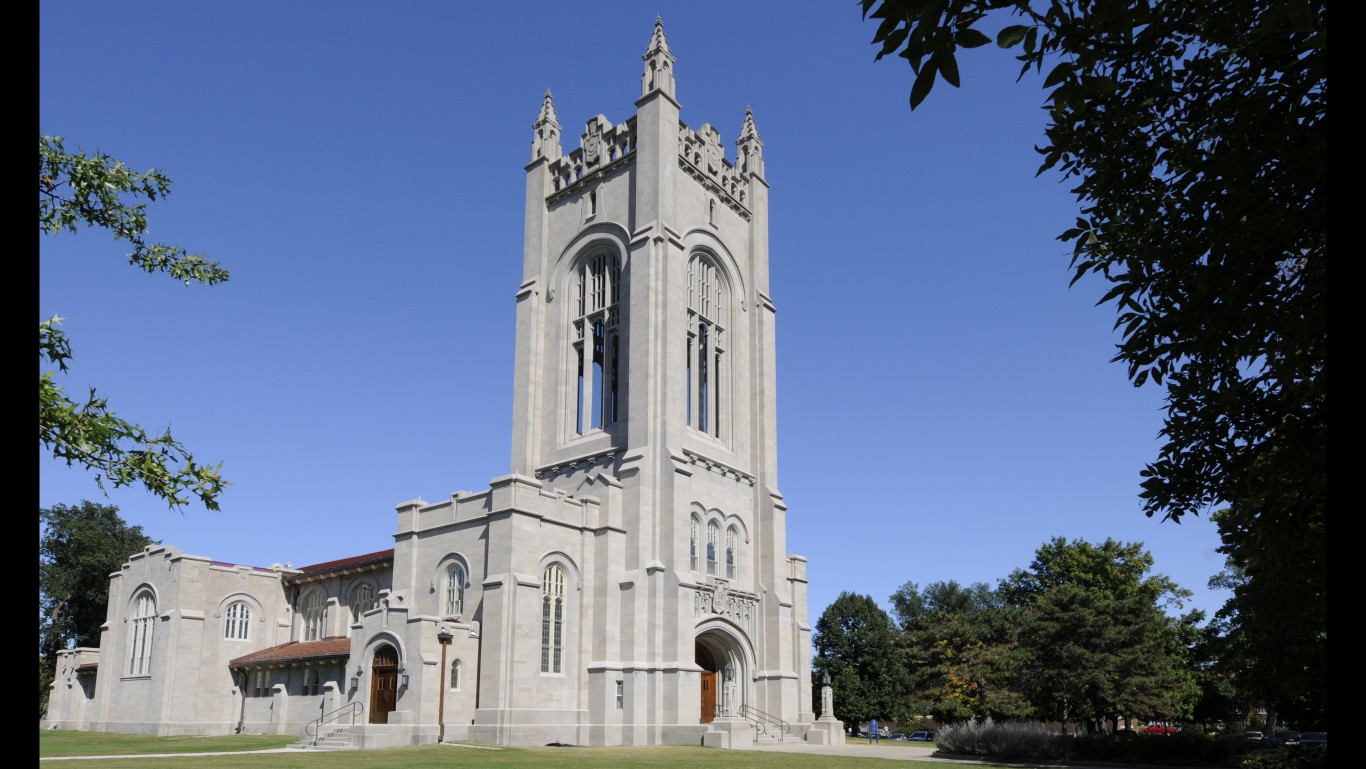
Minnesota: Carleton College
> Location: Northfield
> Acceptance rate for 2018-2019: 19.8%
> Applicants for 2018-2019: 7,092
> Median SAT score: 1440 out of 1600
> Avg. annual cost of attendance: $68,835
> Four-year undergraduate enrollment, fall 2018: 2,046
Carleton College, located in Northfield, Minnesota, about 44 miles south of Minneapolis, is a small private liberal arts school that stresses interdisciplinary scholarship. The Carleton student community is described in the Princeton Review as tight knit and supportive. Among the notable alumni are Pulitzer Prize-winning journalist Jonathan Capehart and Melvin Laird, secretary of defense under President Richard Nixon.
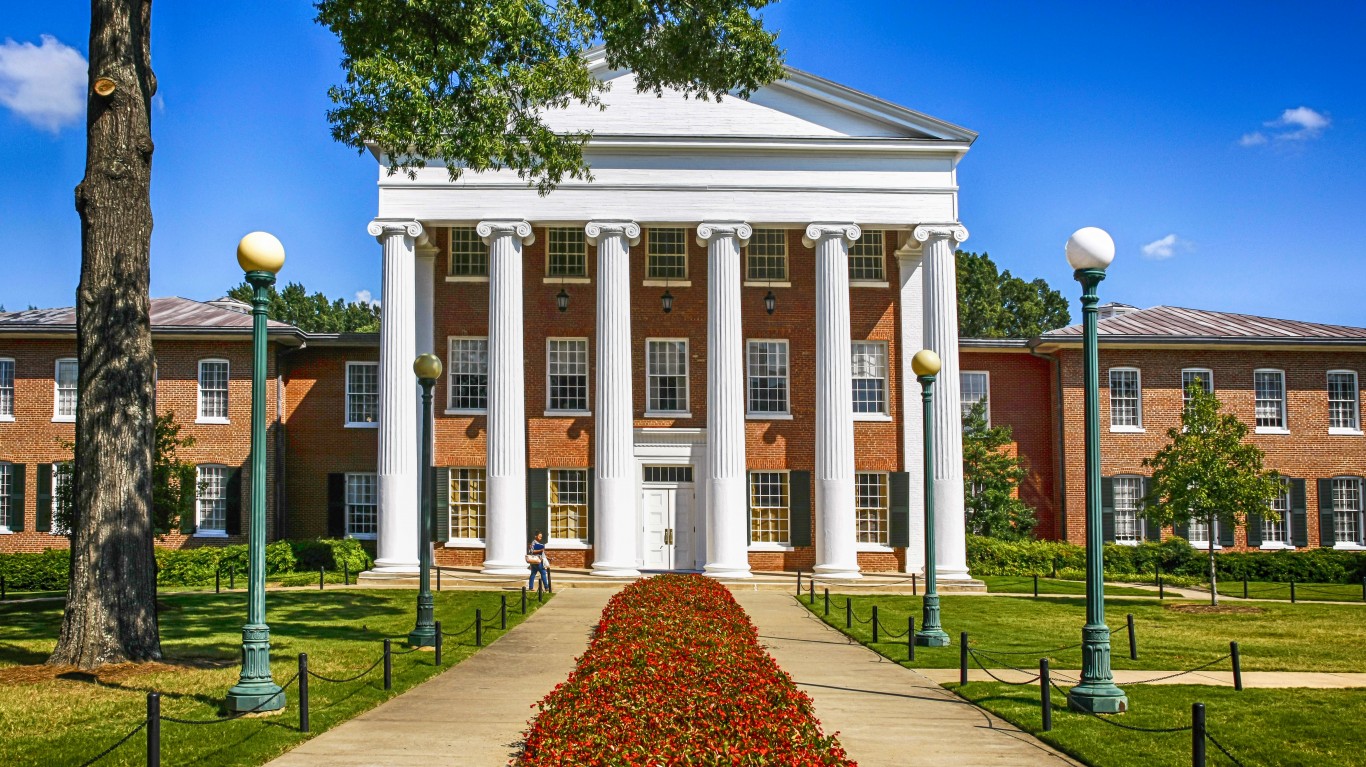
Mississippi: Mississippi College
> Location: Clinton
> Acceptance rate for 2018-2019: 38.4%
> Applicants for 2018-2019: 2,216
> Median SAT score: 1134 out of 1600
> Avg. annual cost of attendance: $32,102
> Four-year undergraduate enrollment, fall 2018: 3,036
Mississippi College, located in Clinton, which is about 11 miles west of the state capital of Jackson, was founded in 1826 and is the oldest institution of higher learning in Mississippi. It is affiliated with the Mississippi Baptist Convention, offering programs in the liberal arts and sciences, nursing, and business. The school’s stated vision is to be “recognized for academic excellence and commitment to the cause of Christ.”
[in-text-ad-2]
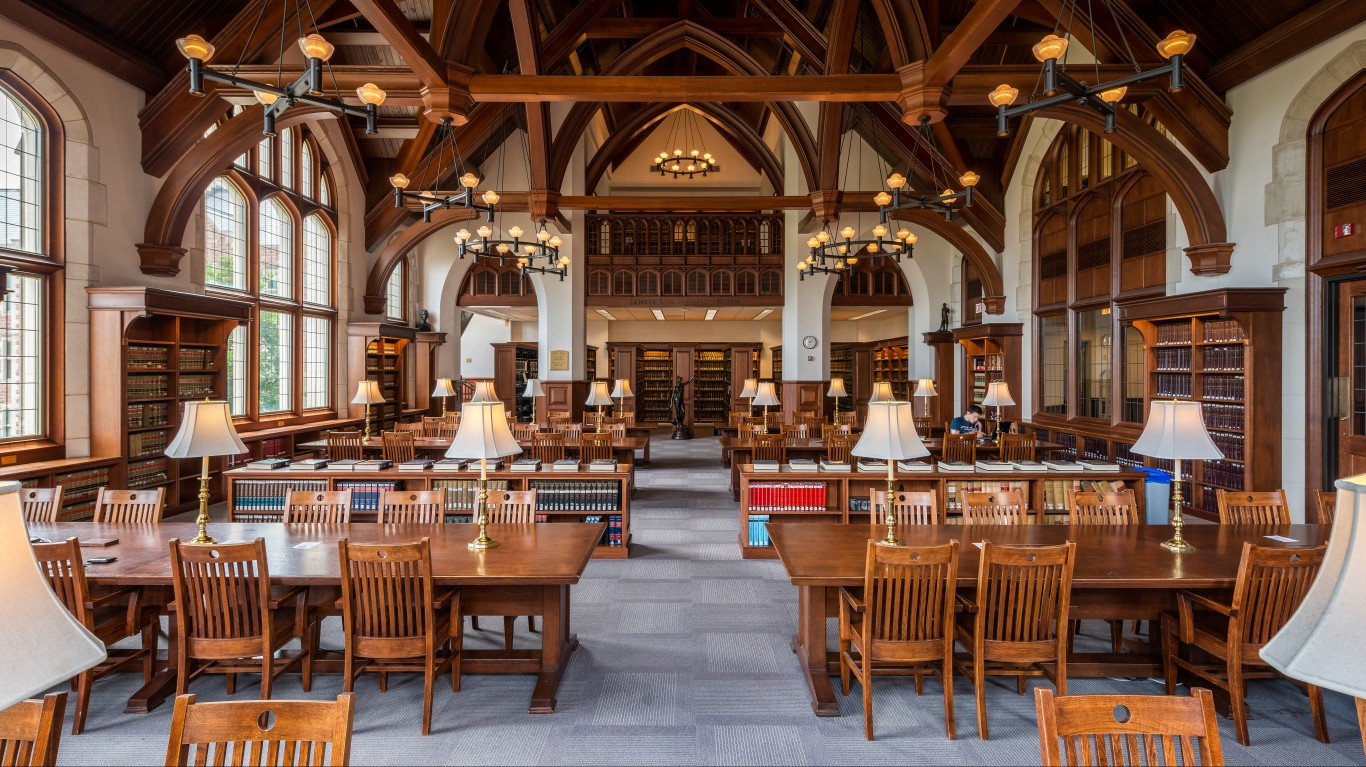
Missouri: Washington University in St. Louis
> Location: St. Louis
> Acceptance rate for 2018-2019: 15.0%
> Applicants for 2018-2019: 31,320
> Median SAT score: 1520 out of 1600
> Avg. annual cost of attendance: $71,975
> Four-year undergraduate enrollment, fall 2018: 7,356
Students at Washington University in St. Louis can design their own curriculum to help them to pursue different areas of study. The school was founded in 1853, and its hilltop campus was designed by noted landscape architect Frederick Law Olmsted in 1895.
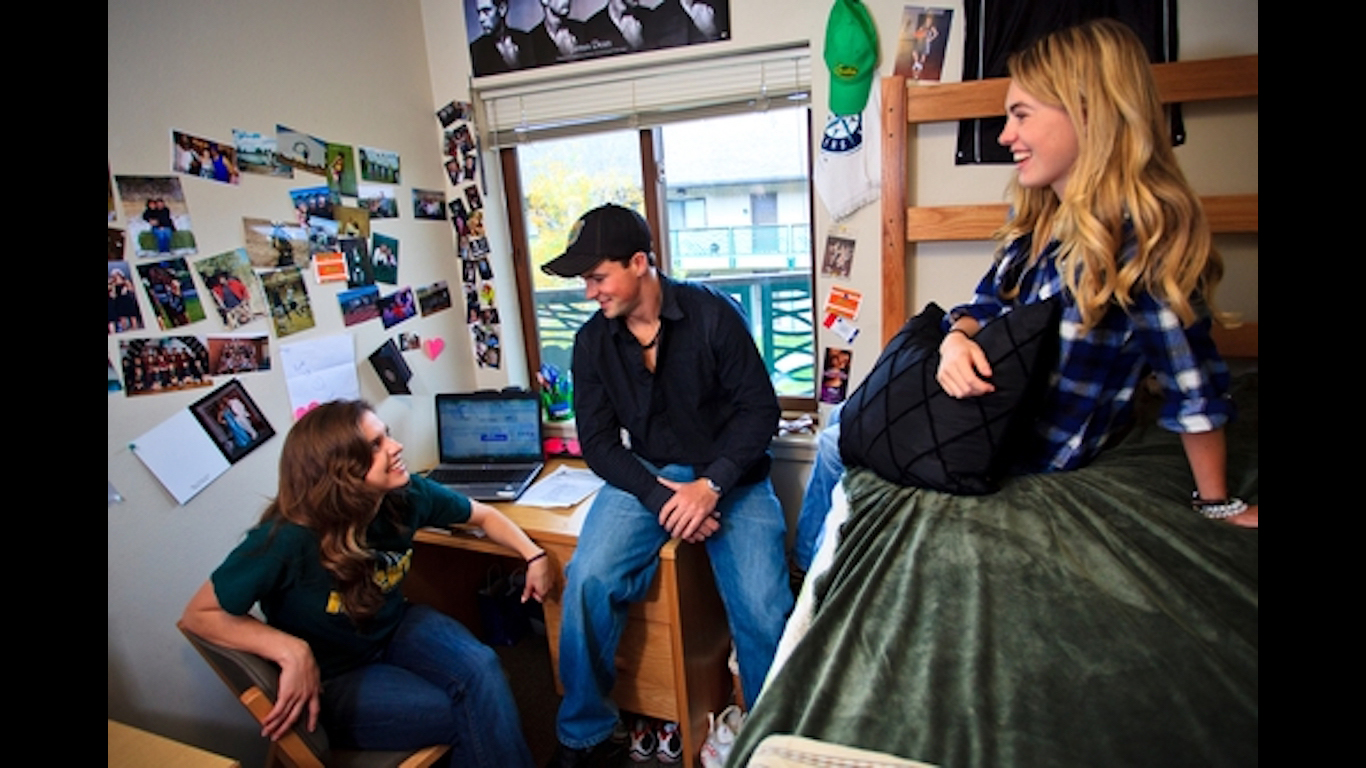
Montana: Rocky Mountain College
> Location: Billings
> Acceptance rate for 2018-2019: 58.4%
> Applicants for 2018-2019: 1,521
> Median SAT score: 1083 out of 1600
> Avg. annual cost of attendance: $38,639
> Four-year undergraduate enrollment, fall 2018: 879
Rocky Mountain College was founded in 1878 in Billings, Montana. At RMC, one of the smallest schools on the list with 897 undergraduates, students can go skiing, rafting, backpacking, and rock climbing, and get class credit.
[in-text-ad]
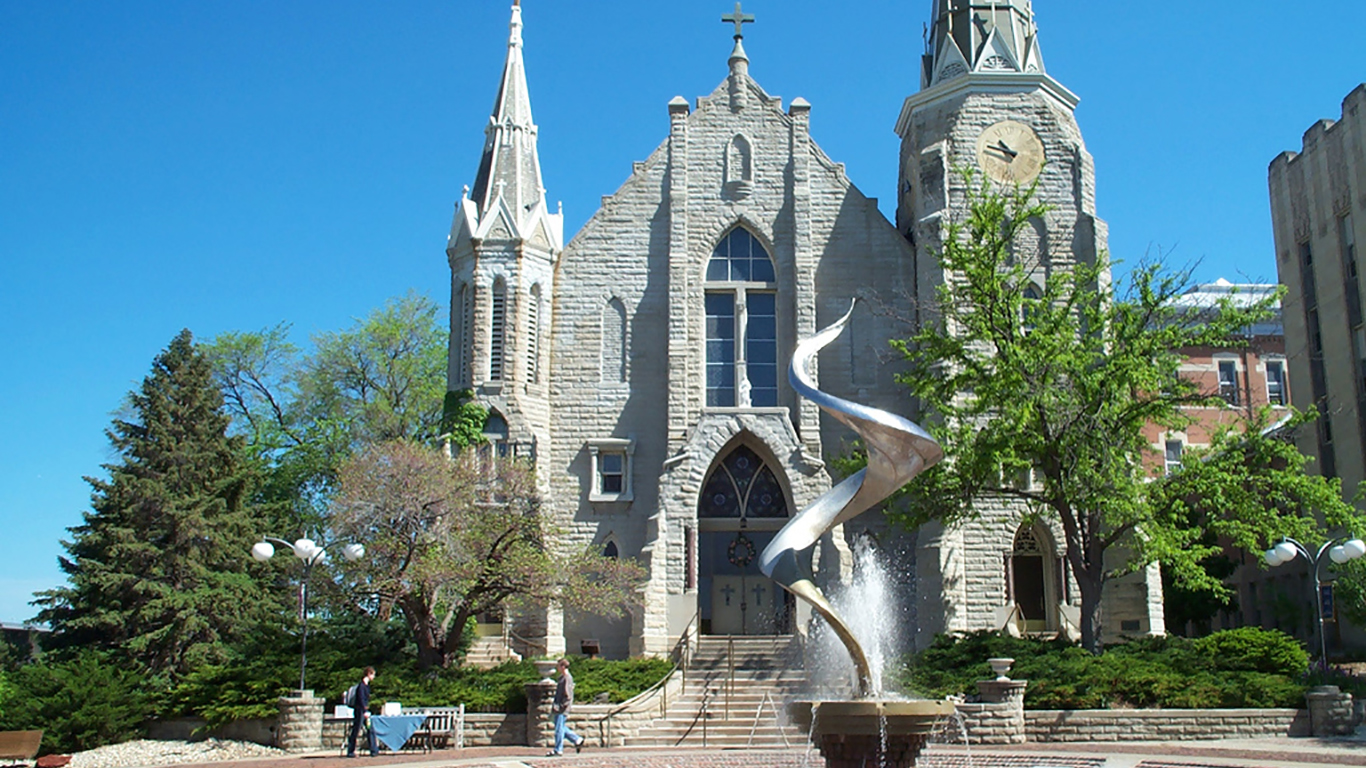
Nebraska: Creighton University
> Location: Omaha
> Acceptance rate for 2018-2019: 71.4%
> Applicants for 2018-2019: 10,112
> Median SAT score: 1250 out of 1600
> Avg. annual cost of attendance: $52,931
> Four-year undergraduate enrollment, fall 2018: 4,405
Creighton University, opened in 1878, is a Jesuit-run institution of higher education located in Omaha, Nebraska. Among its more notable alumni is Bob Gibson, Hall of Fame pitcher for the St. Louis Cardinals.
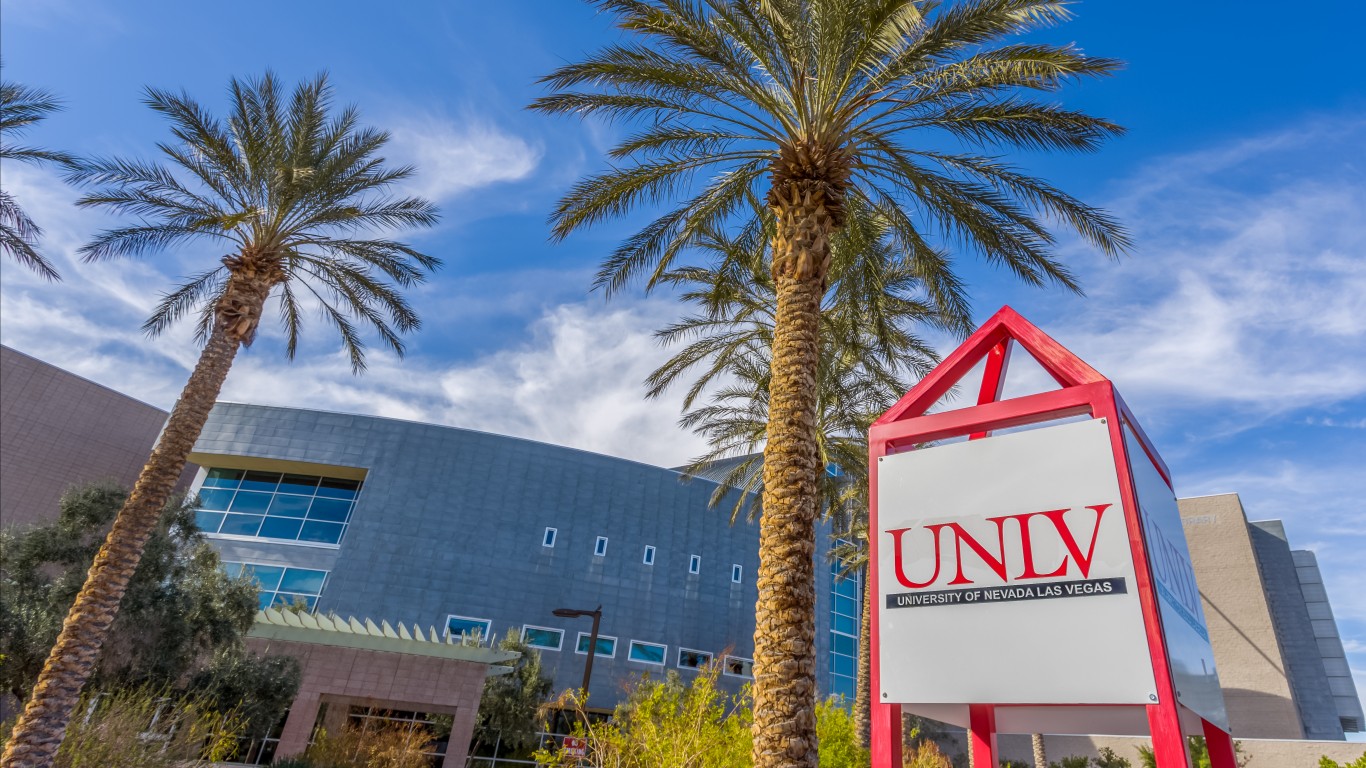
Nevada: University of Nevada-Las Vegas
> Location: Las Vegas
> Acceptance rate for 2018-2019: 82.0%
> Applicants for 2018-2019: 11,612
> Median SAT score: 1135 out of 1600
> Avg. annual cost of attendance: $17,582
> Four-year undergraduate enrollment, fall 2018: 24,707
University of Nevada-Las Vegas is one of the newer schools on the list, founded in 1957. Because the school is located in Las Vegas, not surprisingly, one of its colleges is The William F. Harrah College of Hospitality. UNLV also has schools for engineering, nursing, business, and urban affairs.
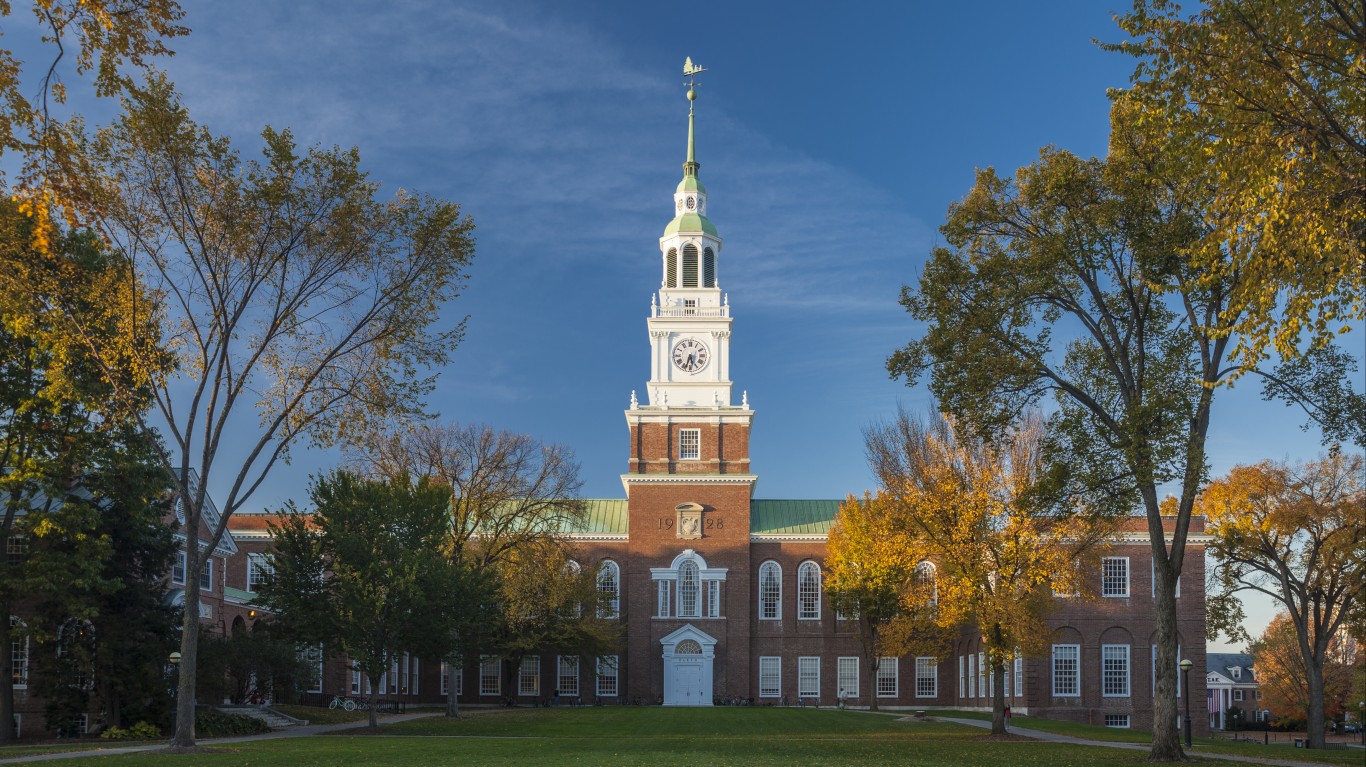
New Hampshire: Dartmouth College
> Location: Hanover
> Acceptance rate for 2018-2019: 8.7%
> Applicants for 2018-2019: 22,033
> Median SAT score: 1490 out of 1600
> Avg. annual cost of attendance: $71,827
> Four-year undergraduate enrollment, fall 2018: 4,312
Dartmouth College was founded in 1769 by Rev. Eleazar Wheelock as a learning institution for Native Americans. In addition to one of the most competitive undergraduate admissions, the Ivy League university’s professional schools — the Geisel School of Medicine, Thayer School of Engineering, and the Tuck School of Business — are some of the most selective in the world.
Among its alumni is statesman and orator Daniel Webster, who served as secretary of state under three presidents, as well as American author Theodor Geisel, better known as Dr. Seuss.
[in-text-ad-2]
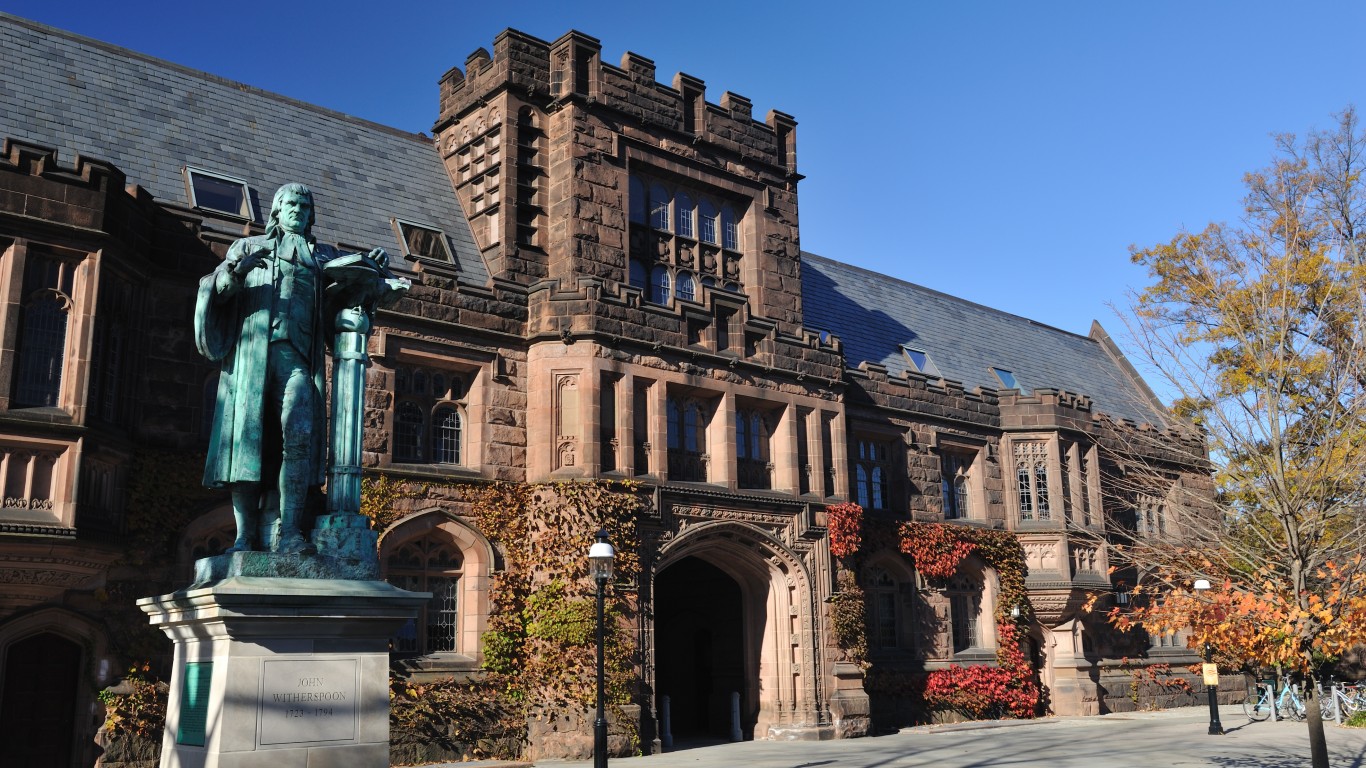
New Jersey: Princeton University
> Location: Princeton
> Acceptance rate for 2018-2019: 5.5%
> Applicants for 2018-2019: 35,370
> Median SAT score: 1505 out of 1600
> Avg. annual cost of attendance: $66,950
> Four-year undergraduate enrollment, fall 2018: 5,301
Princeton University, founded in 1746, is among the hardest schools in the country to gain admittance. The Ivy League university played another New Jersey college, Rutgers, in the first collegiate football game in 1869. Among Princeton’s notable alumni are Amazon founder and CEO Jeff Bezos, former first lady Michelle Obama, mathematician and among the developers of computer science Alan Turing, and actor James Stewart.
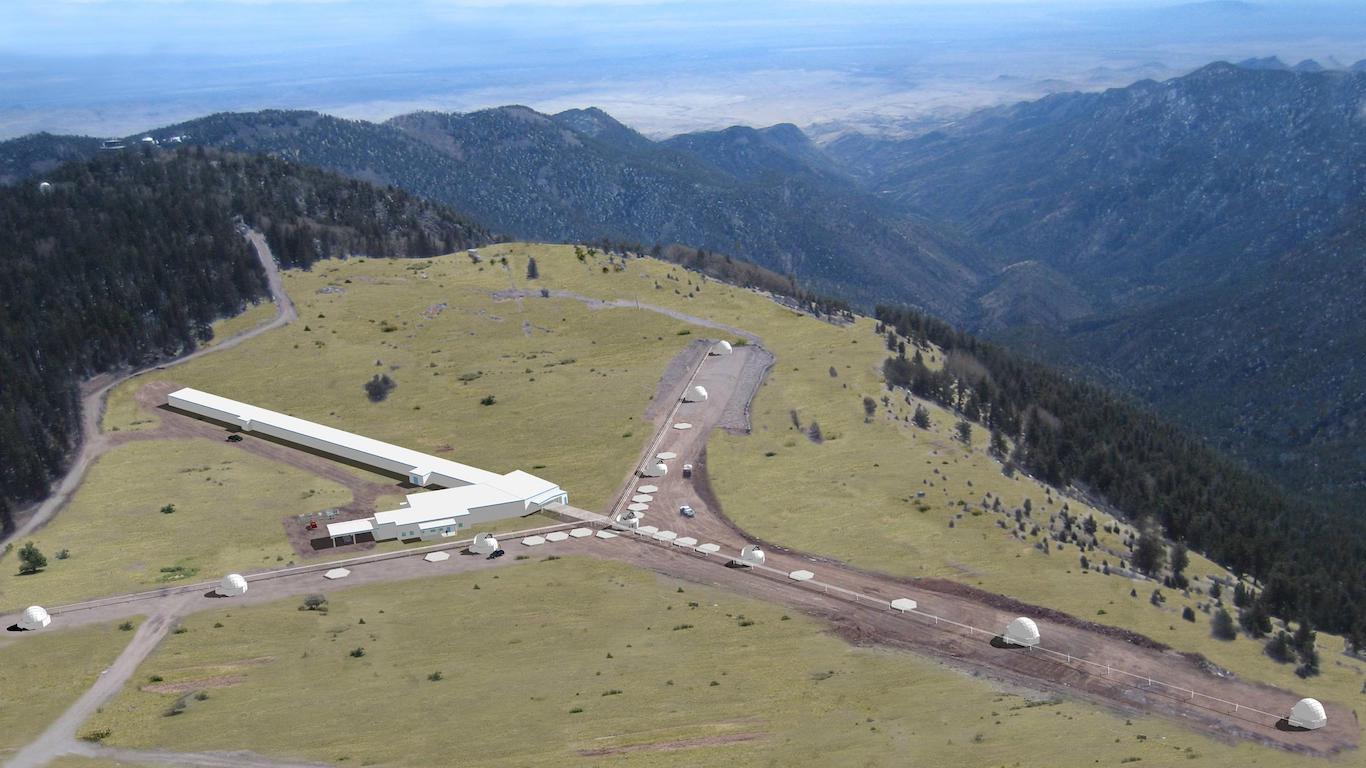
New Mexico: New Mexico Institute of Mining and Technology
> Location: Socorro
> Acceptance rate for 2018-2019: 23.2%
> Applicants for 2018-2019: 1,740
> Median SAT score: 1305 out of 1600
> Avg. annual cost of attendance: $21,244
> Four-year undergraduate enrollment, fall 2018: 1,333
The New Mexico Institute of Mining and Technology, founded in 1889 — before New Mexico became a state, is located in the town of Socorro, about 76 miles south of Albuquerque. In addition to mining, it offers courses of study in biology, chemistry, chemical engineering, business, and technology management.
[in-text-ad]
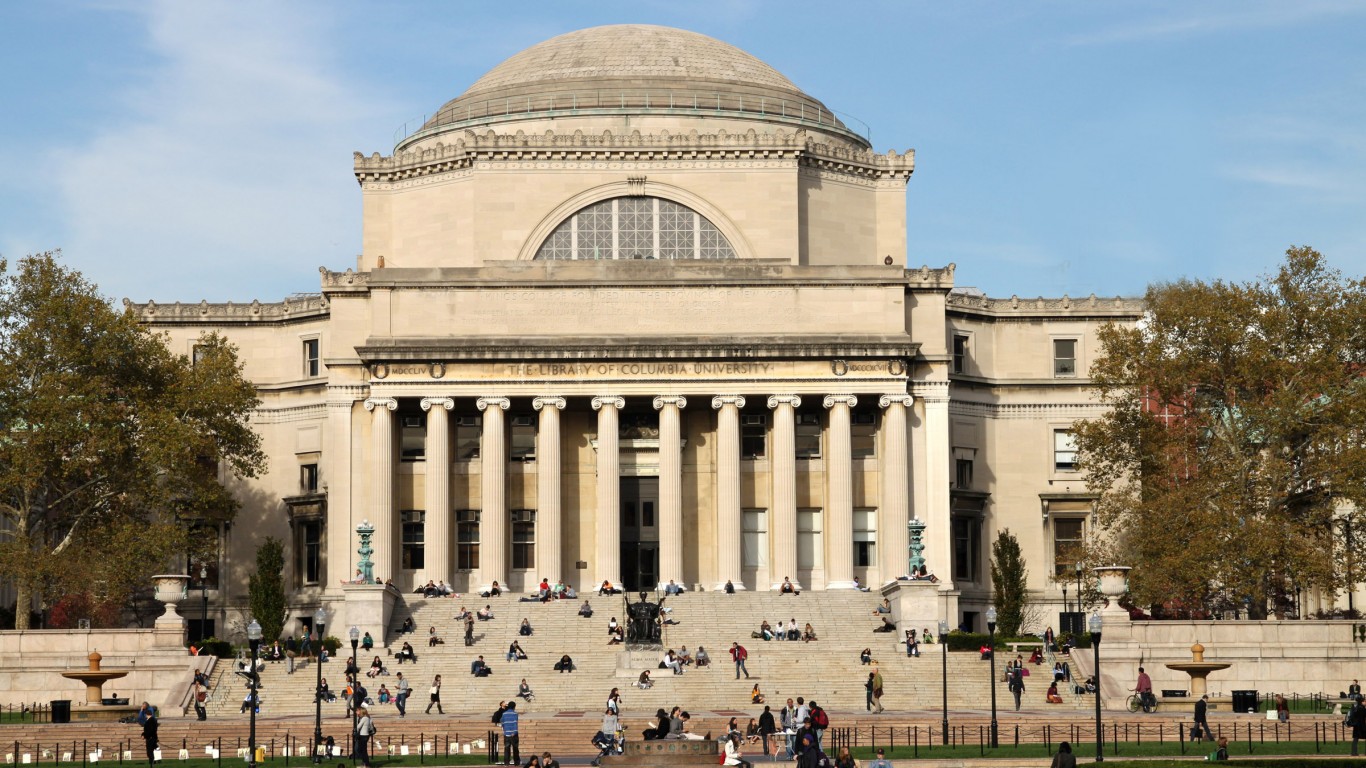
New York: Columbia University in the City of New York
> Location: New York
> Acceptance rate for 2018-2019: 5.9%
> Applicants for 2018-2019: 40,572
> Median SAT score: 1505 out of 1600
> Avg. annual cost of attendance: $74,435
> Four-year undergraduate enrollment, fall 2018: 8,216
Columbia University, founded in 1754 on the Upper West Side of Manhattan, is one of the most difficult colleges to attend anywhere. Only 5.9% of applicants were accepted for the 2018-2019 school year. The university is also one of the most expensive, with an average annual cost of attendance of $74,435.
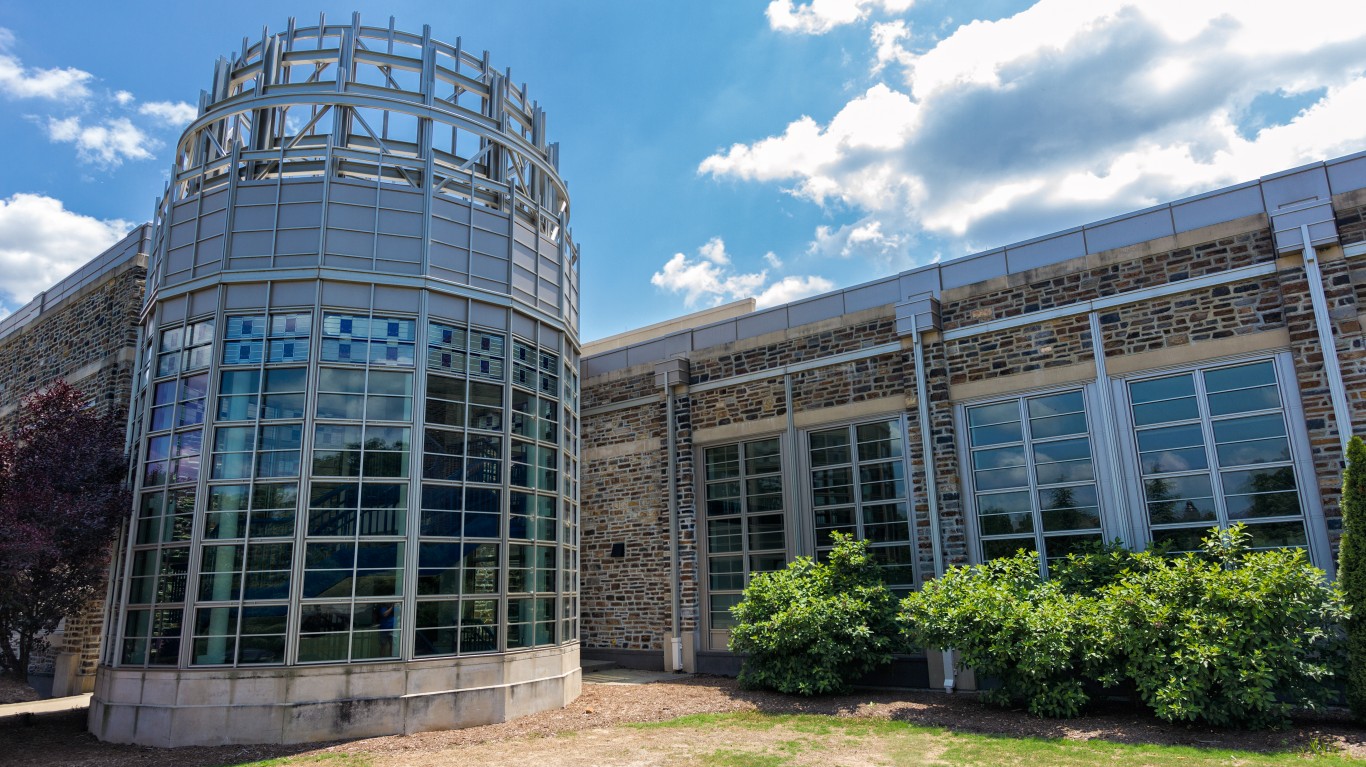
North Carolina: Duke University
> Location: Durham
> Acceptance rate for 2018-2019: 8.9%
> Applicants for 2018-2019: 35,786
> Median SAT score: 1510 out of 1600
> Avg. annual cost of attendance: $72,466
> Four-year undergraduate enrollment, fall 2018: 6,596
Duke University’s very successful men’s basketball team has helped raise the profile of the prestigious institution where students can major in computer science, economics, and public policy, among other courses of study. Duke is also known for its law school, whose graduates include Richard Nixon, the 37th president of the United States.
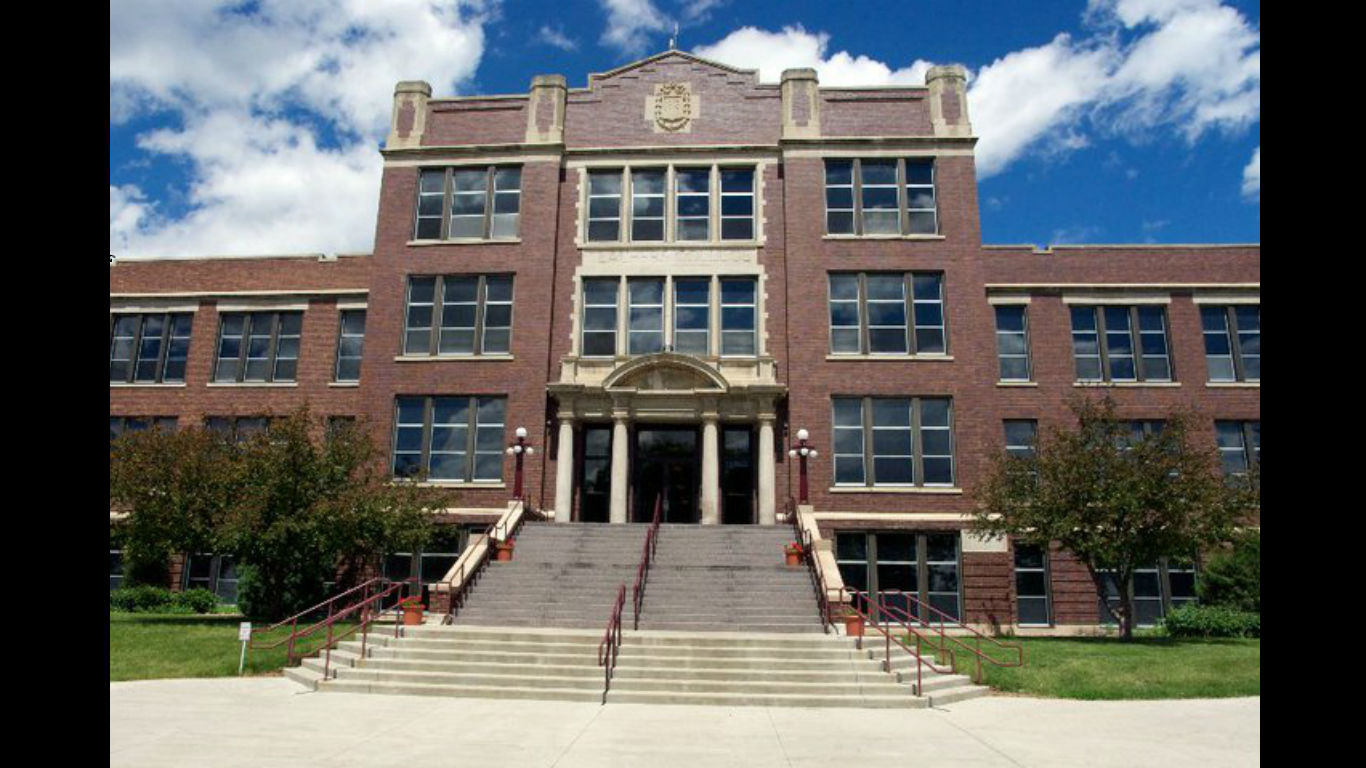
North Dakota: Minot State University
> Location: Minot
> Acceptance rate for 2018-2019: 50.1%
> Applicants for 2018-2019: 1,040
> Median SAT score: 1025 out of 1600
> Avg. annual cost of attendance: $15,576
> Four-year undergraduate enrollment, fall 2018: 2,410
Minot State University is located in the northern part of North Dakota in the city of Minot. It is a public university founded in 1913 as a teaching institution to serve the North Dakota prairie. Minot State’s most popular majors are business administration and management, nursing, and teaching.
[in-text-ad-2]

Ohio: Case Western Reserve University
> Location: Cleveland
> Acceptance rate for 2018-2019: 29.3%
> Applicants for 2018-2019: 26,642
> Median SAT score: 1435 out of 1600
> Avg. annual cost of attendance: $67,083
> Four-year undergraduate enrollment, fall 2018: 5,131
Case Western Reserve University was founded in 1826. About one-third of Case’s students belong to fraternities or sororities. Among its notable alumni are former Representative and presidential candidate Dennis Kucinich and Craigslist founder Craig Newmark.
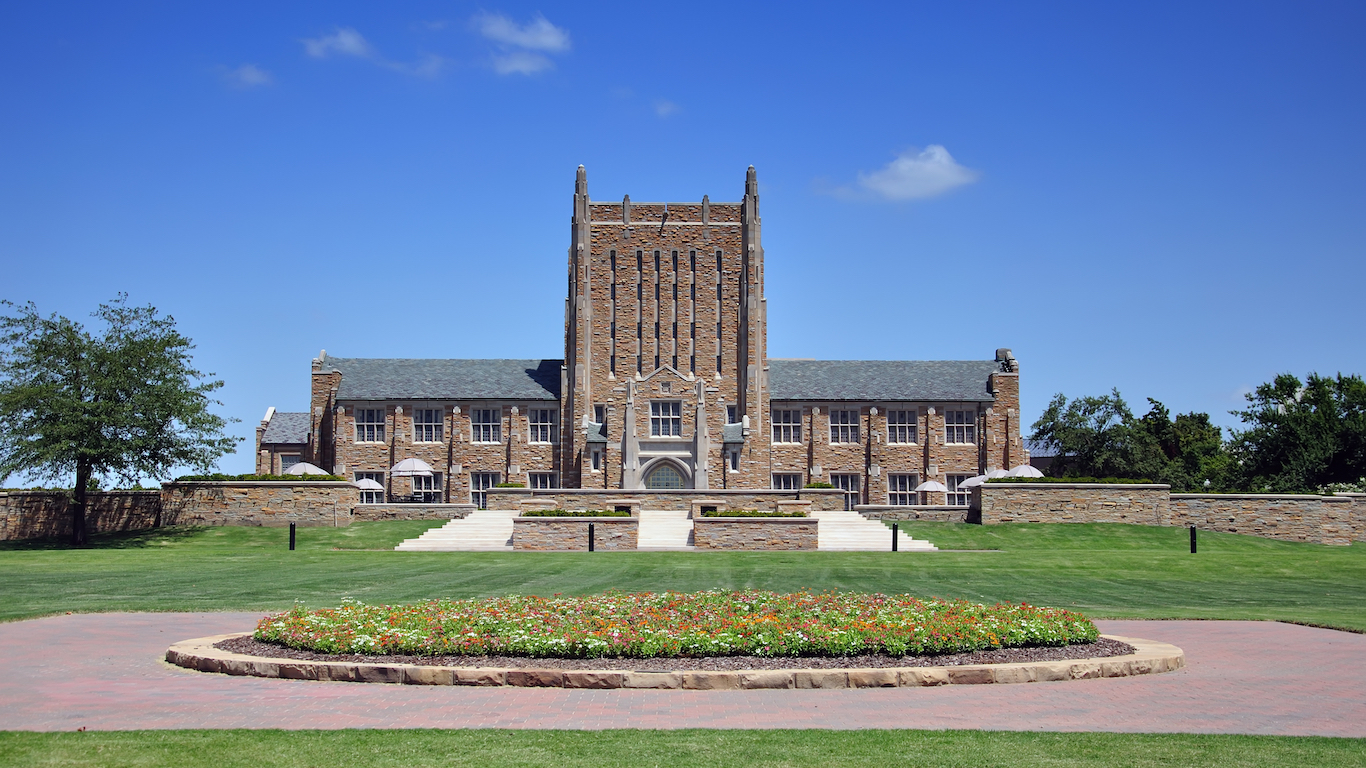
Oklahoma: University of Tulsa
> Location: Tulsa
> Acceptance rate for 2018-2019: 40.8%
> Applicants for 2018-2019: 8,526
> Median SAT score: 1295 out of 1600
> Avg. annual cost of attendance: $56,906
> Four-year undergraduate enrollment, fall 2018: 3,246
The University of Tulsa, founded in 1894, is a private institution known for its petroleum engineering programs, which are taught in a facility that features a drilling simulator. The school opened one of the first mosques on a college campus in the nation. More than half of the students come from out of state, including from nearly 70 countries.
[in-text-ad]
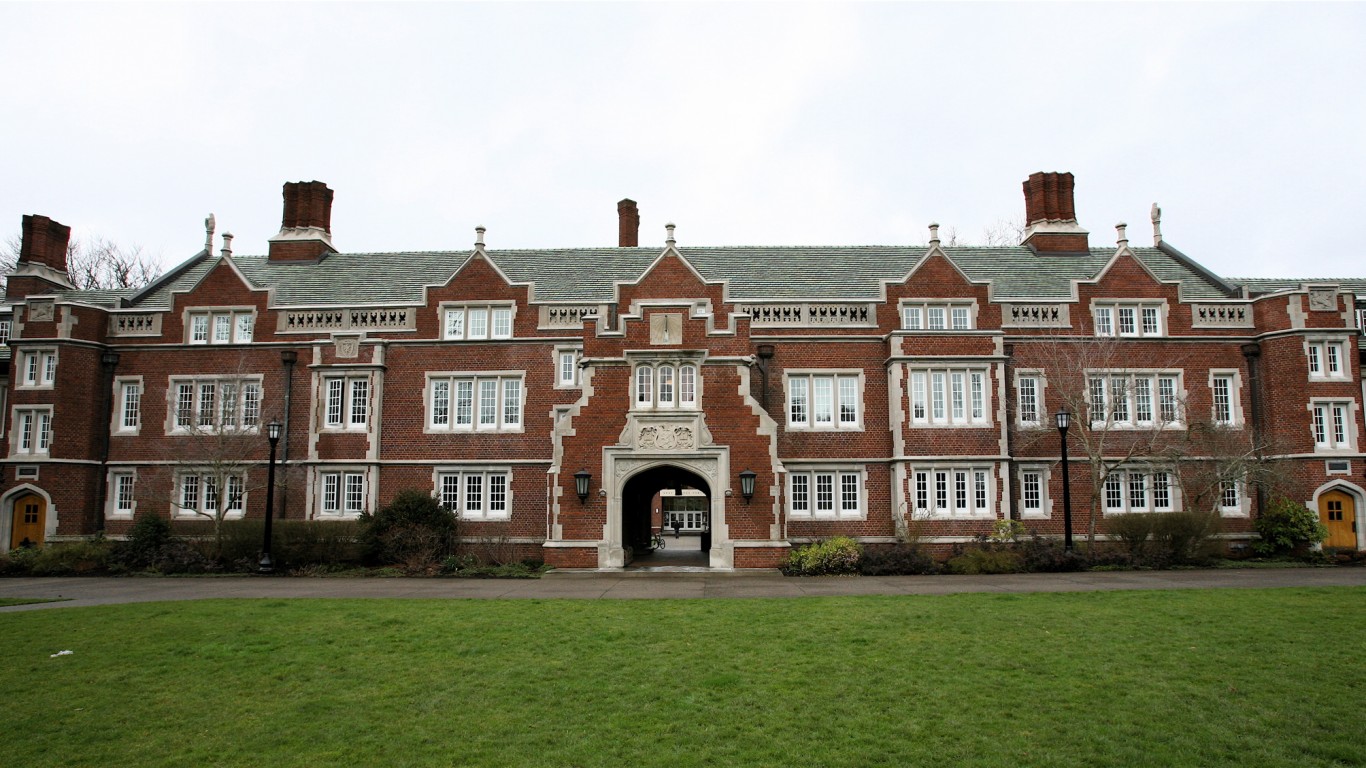
Oregon: Reed College
> Location: Portland
> Acceptance rate for 2018-2019: 35.0%
> Applicants for 2018-2019: 5,957
> Median SAT score: 1415 out of 1600
> Avg. annual cost of attendance: $69,734
> Four-year undergraduate enrollment, fall 2018: 1,456
Reed College, located in Portland, Oregon, is a small private liberal arts college that was founded in 1908. It has one of the lower acceptance rates on this list, at 35%. The college claims its curriculum includes a unique incorporation of classical studies across its disciplines.
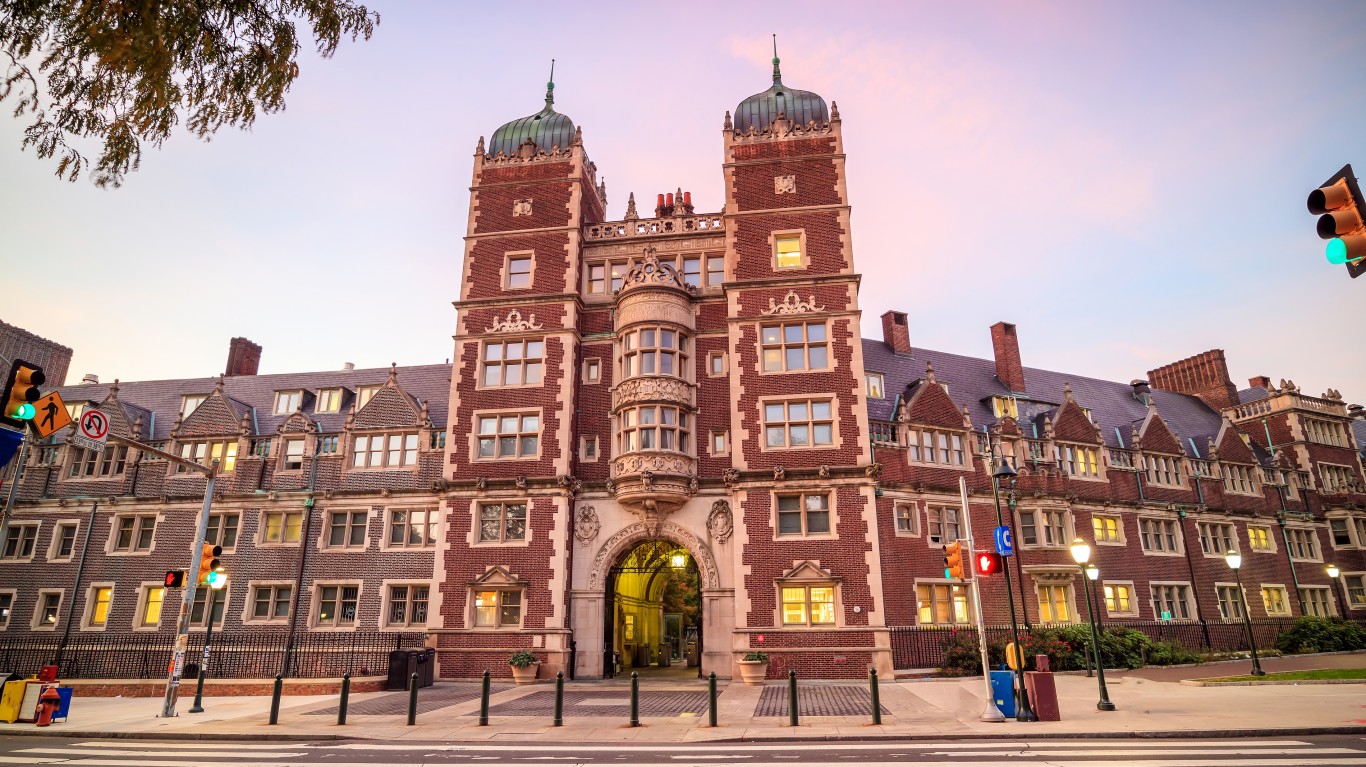
Pennsylvania: University of Pennsylvania
> Location: Philadelphia
> Acceptance rate for 2018-2019: 8.4%
> Applicants for 2018-2019: 44,491
> Median SAT score: 1485 out of 1600
> Avg. annual cost of attendance: $72,584
> Four-year undergraduate enrollment, fall 2018: 10,764
The University of Pennsylvania is another of the Ivy League schools founded in colonial times, in 1740 by Benjamin Franklin. According to Princeton Review, students laud the university for its combination of urban setting with a traditional college campus. Poet William Carlos Williams is an alumnus of Penn.
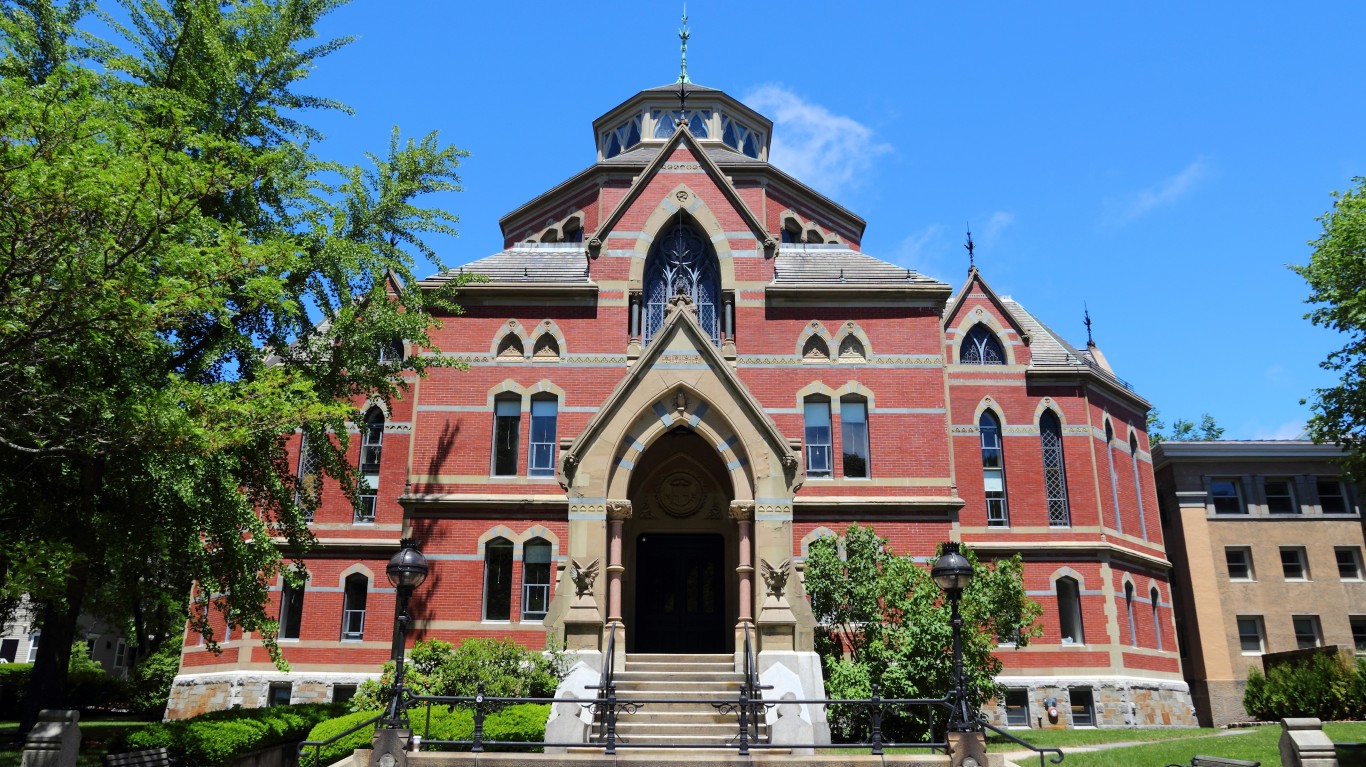
Rhode Island: Brown University
> Location: Providence
> Acceptance rate for 2018-2019: 7.7%
> Applicants for 2018-2019: 35,437
> Median SAT score: 1485 out of 1600
> Avg. annual cost of attendance: $71,050
> Four-year undergraduate enrollment, fall 2018: 6,752
Ivy League schools are the hardest colleges to get into in their respective states, and Brown University in Providence, Rhode Island, is among them. Brown students design their own courses of study. Brown’s English and history programs are well-regarded, as is its Warren Alpert Medical School. Business moguls John D. Rockefeller Jr. and Ted Turner are Brown alumni.
[in-text-ad-2]
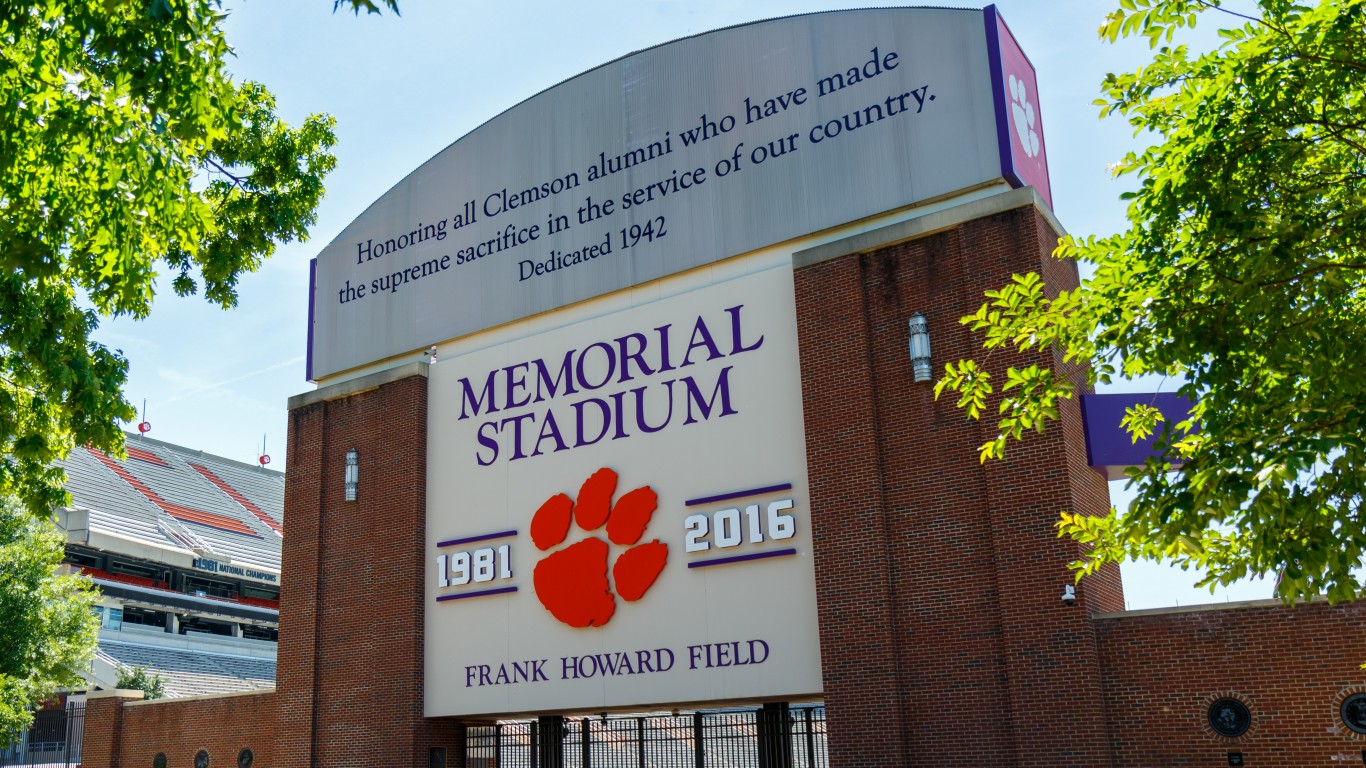
South Carolina: Clemson University
> Location: Clemson
> Acceptance rate for 2018-2019: 47.2%
> Applicants for 2018-2019: 28,845
> Median SAT score: 1310 out of 1600
> Avg. annual cost of attendance: $29,499
> Four-year undergraduate enrollment, fall 2018: 19,564
Clemson University’s profile has been raised in recent years by the success of its football program, which has won two national championships in the last four years. Commonly chosen majors at Clemson, founded in 1889, range from accounting to youth development. Students frequently participate in projects that include combating bullying in South Carolina high schools.
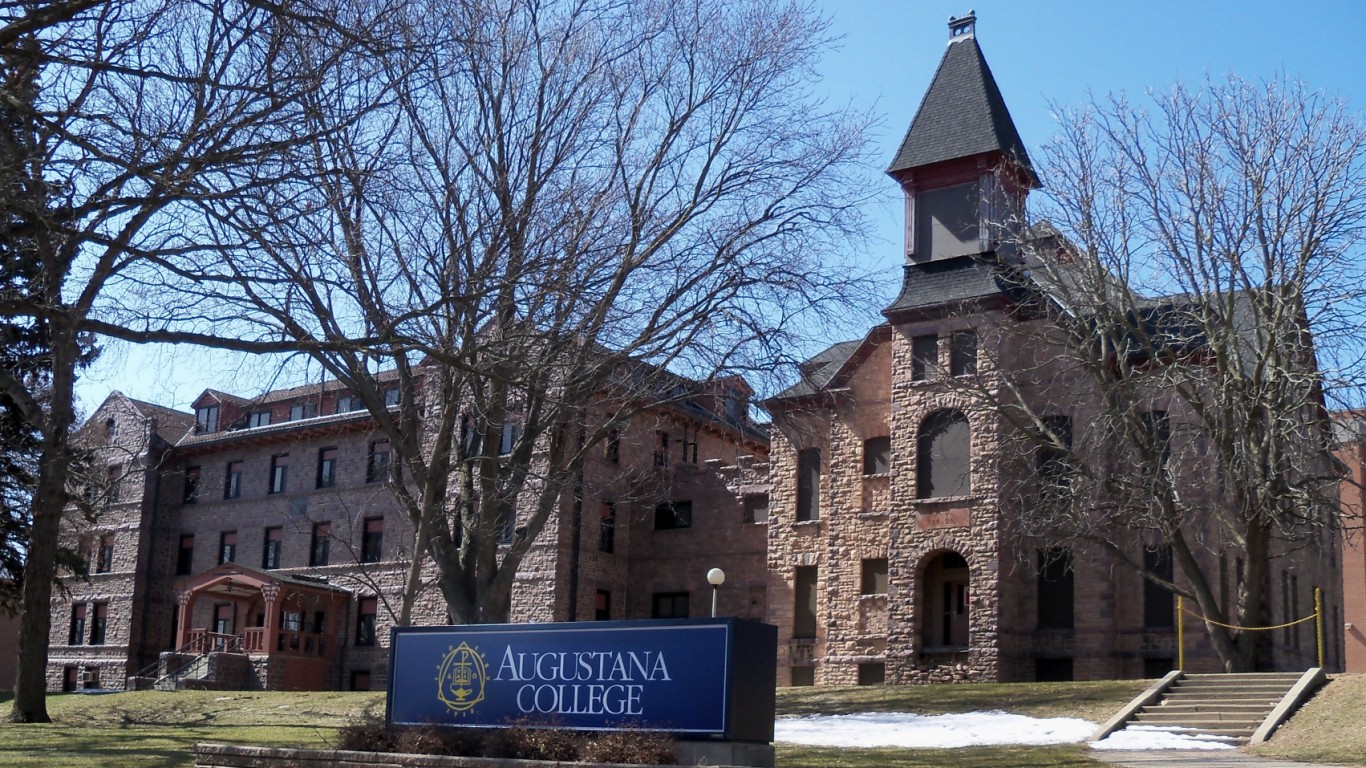
South Dakota: Augustana University
> Location: Sioux Falls
> Acceptance rate for 2018-2019: 65.4%
> Applicants for 2018-2019: 2,201
> Median SAT score: 1195 out of 1600
> Avg. annual cost of attendance: $45,145
> Four-year undergraduate enrollment, fall 2018: 1,752
Augustana College, located at Sioux Falls, South Dakota, is a private liberal arts school affiliated with the Lutheran Church. The school was founded in 1860, before South Dakota became a state. “Entertainment Tonight” host Mary Hart is an alumna of Augustana.
[in-text-ad]
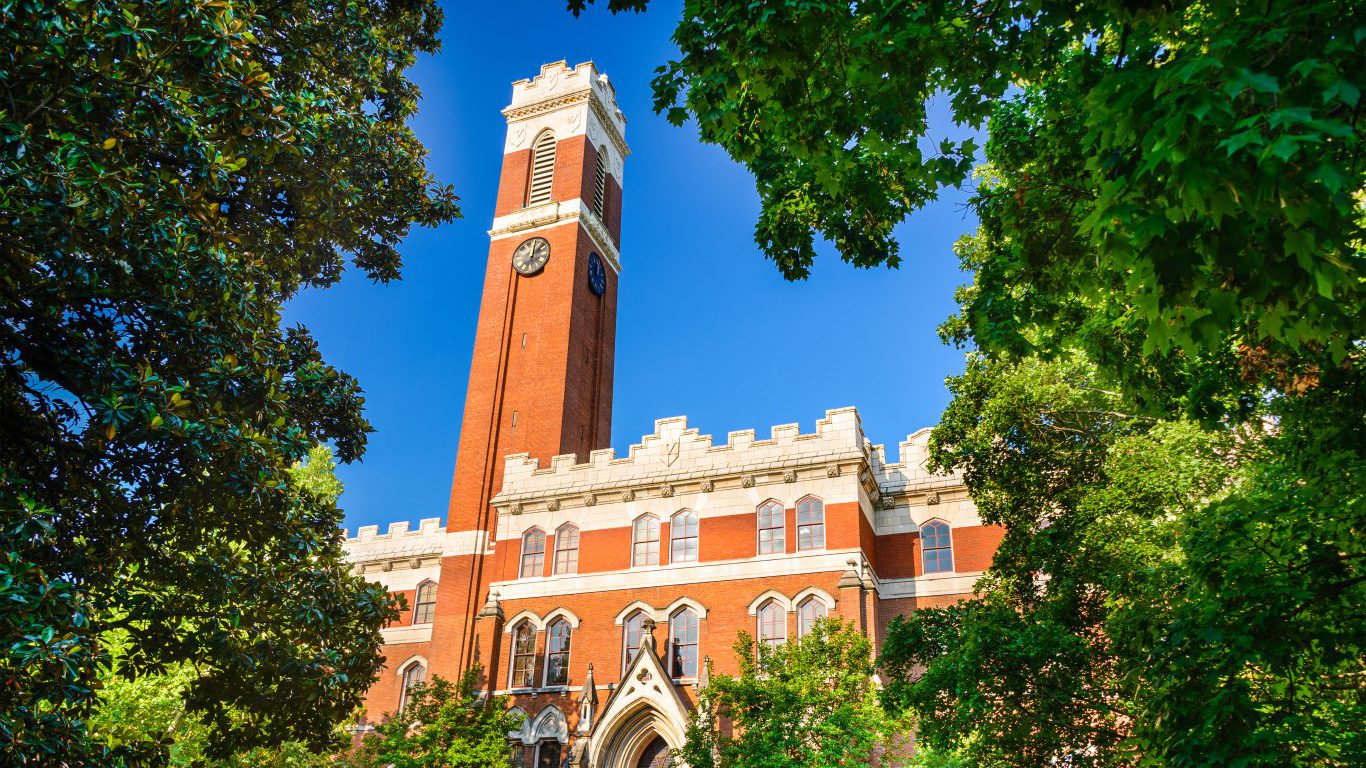
Tennessee: Vanderbilt University
> Location: Nashville
> Acceptance rate for 2018-2019: 9.6%
> Applicants for 2018-2019: 34,313
> Median SAT score: 1505 out of 1600
> Avg. annual cost of attendance: $67,392
> Four-year undergraduate enrollment, fall 2018: 6,840
Vanderbilt University owes its origins to railroad mogul Cornelius Vanderbilt, who gave $1 million to the university in 1873. Vanderbilt, one of the South’s most prestigious schools, is known for its undergraduate pre-med program and medical school. Vanderbilt alumni Al Gore Jr. and Muhammad Yunas each won the Nobel Peace Prize in 2007 and 2006, respectively.
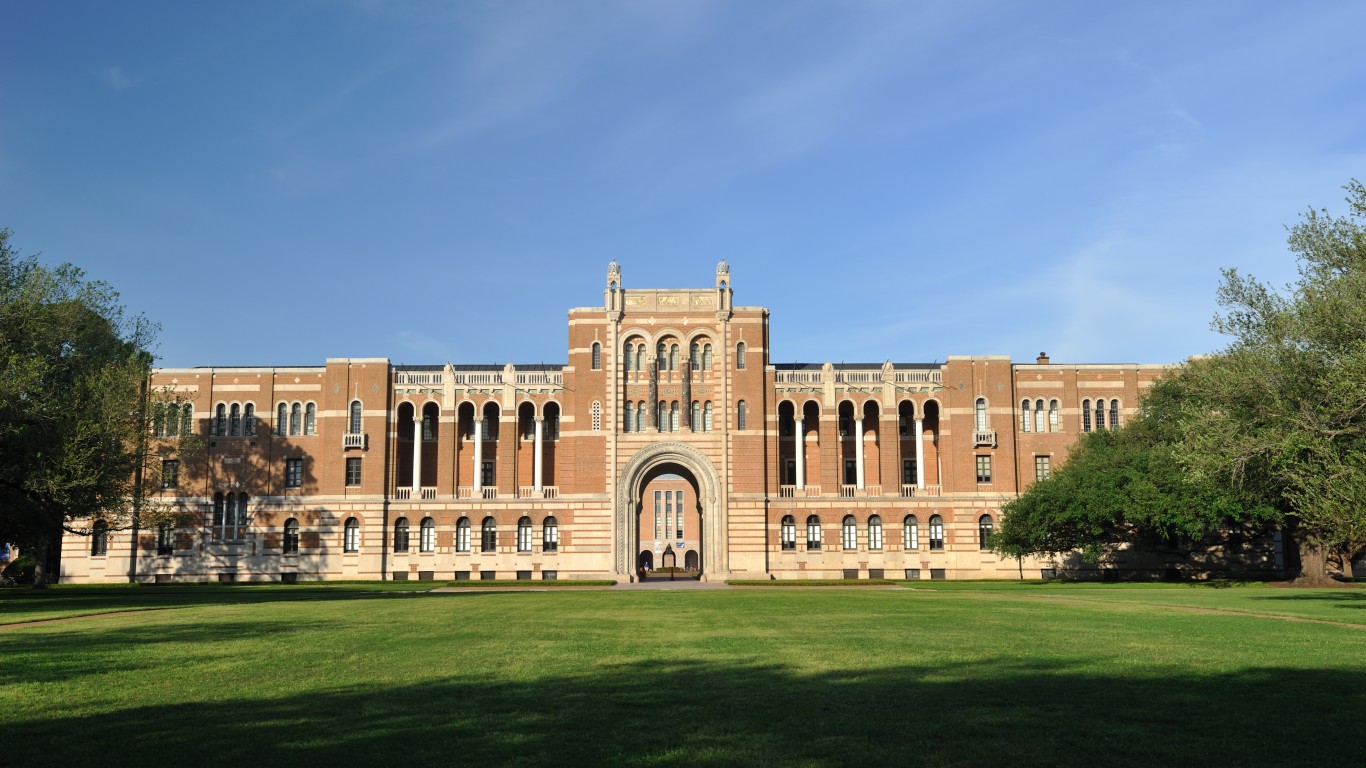
Texas: Rice University
> Location: Houston
> Acceptance rate for 2018-2019: 11.1%
> Applicants for 2018-2019: 20,923
> Median SAT score: 1505 out of 1600
> Avg. annual cost of attendance: $63,158
> Four-year undergraduate enrollment, fall 2018: 3,962
Rice University, founded in 1912 and located in Houston’s Museum District, has been ranked by the Princeton Review as having the happiest students in the United States. Princeton Review cited Rice students’ favorable experiences with faculty, research capabilities, and collaboration with outside institutions. Rice alumnus Alberto R. Gonzales became the nation’s first Hispanic attorney general in 2005.
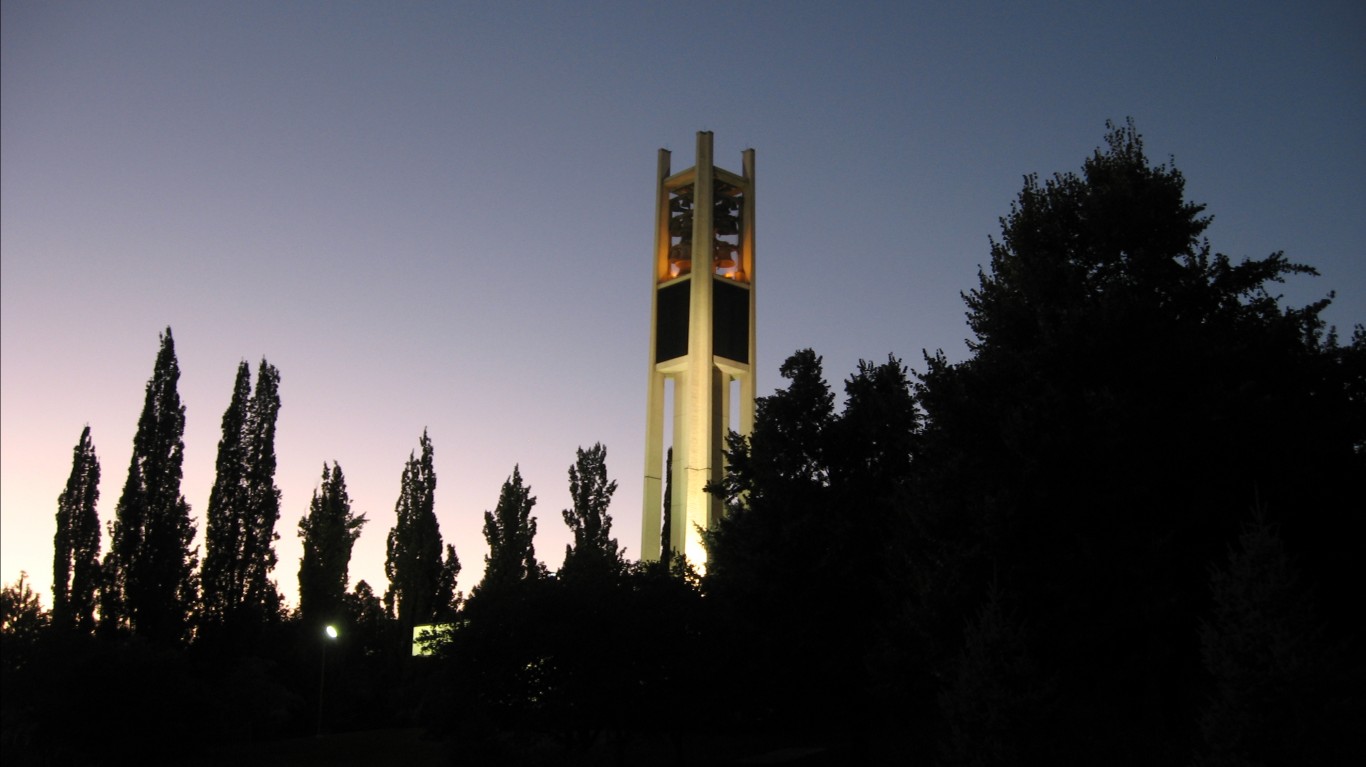
Utah: Brigham Young University-Provo
> Location: Provo
> Acceptance rate for 2018-2019: 64.5%
> Applicants for 2018-2019: 11,205
> Median SAT score: 1305 out of 1600
> Avg. annual cost of attendance: $18,136
> Four-year undergraduate enrollment, fall 2018: 31,441
Brigham Young University was founded by the Mormon Church in 1875. Students are asked to adhere to its “honor code” that requires abstinence from drugs, alcohol, tobacco, coffee, tea, and what the church views as “inappropriate” “sexual activity, such as sex outside of marriage. About 25% of Brigham Young students are married.
[in-text-ad-2]
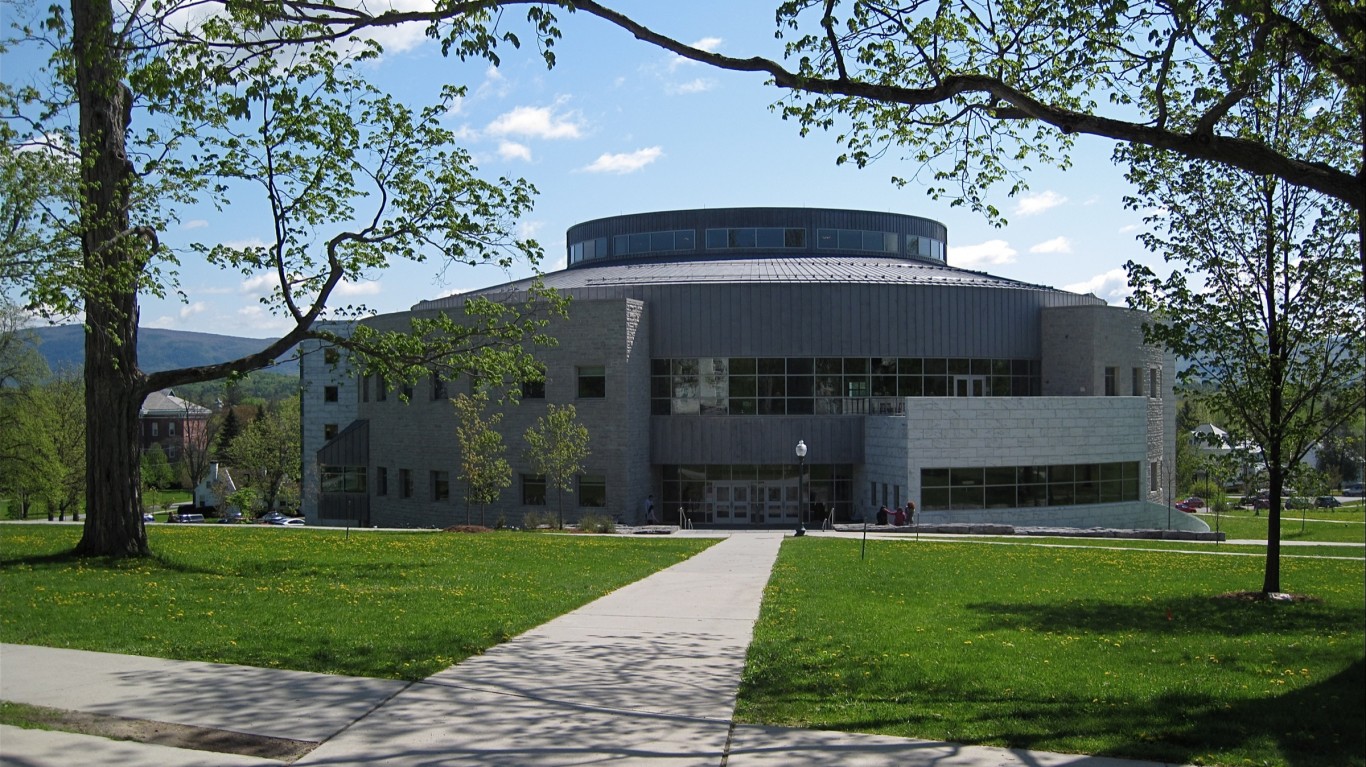
Vermont: Middlebury College
> Location: Middlebury
> Acceptance rate for 2018-2019: 16.7%
> Applicants for 2018-2019: 9,227
> Median SAT score: 1415 out of 1600
> Avg. annual cost of attendance: $69,464
> Four-year undergraduate enrollment, fall 2018: 2,550
Middlebury College, founded in 1800, is regarded as one of the most rigorous small private liberal arts colleges in the U.S. Middlebury’s scenic location near mountains, lakes, and ski trails, likely attracts students who value the outdoors.
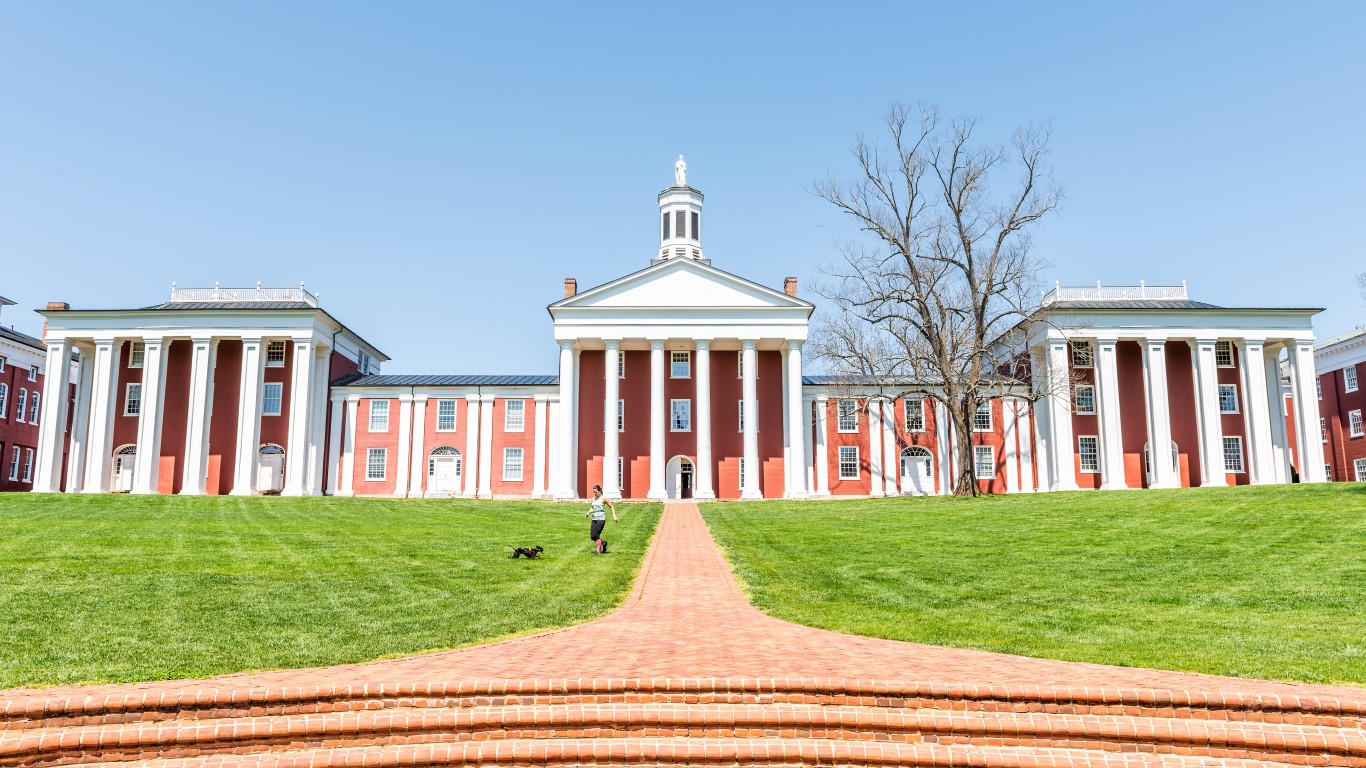
Virginia: Washington and Lee University
> Location: Lexington
> Acceptance rate for 2018-2019: 21.2%
> Applicants for 2018-2019: 5,855
> Median SAT score: 1419 out of 1600
> Avg. annual cost of attendance: $67,150
> Four-year undergraduate enrollment, fall 2018: 1,822
Washington and Lee University, founded in 1749, was named after George Washington, who made an endowment to the school, and Confederate general Robert E. Lee, who became president of the college after the Civil War. Greek life plays a big role in the social environment of the school, with 80% of students belonging to fraternities and sororities. Author Tom Wolfe and explorer Meriwether Lewis of the Lewis and Clark Expedition are among the school’s notable alumni.
[in-text-ad]
Washington: University of Washington-Seattle Campus
> Location: Seattle
> Acceptance rate for 2018-2019: 48.7%
> Applicants for 2018-2019: 45,907
> Median SAT score: 1340 out of 1600
> Avg. annual cost of attendance: $25,275
> Four-year undergraduate enrollment, fall 2018: 30,905
Founded in 1861, University of Washington is one of the oldest public universities in the western United States and one of the largest schools on the list. The university’s main campus is in Seattle.
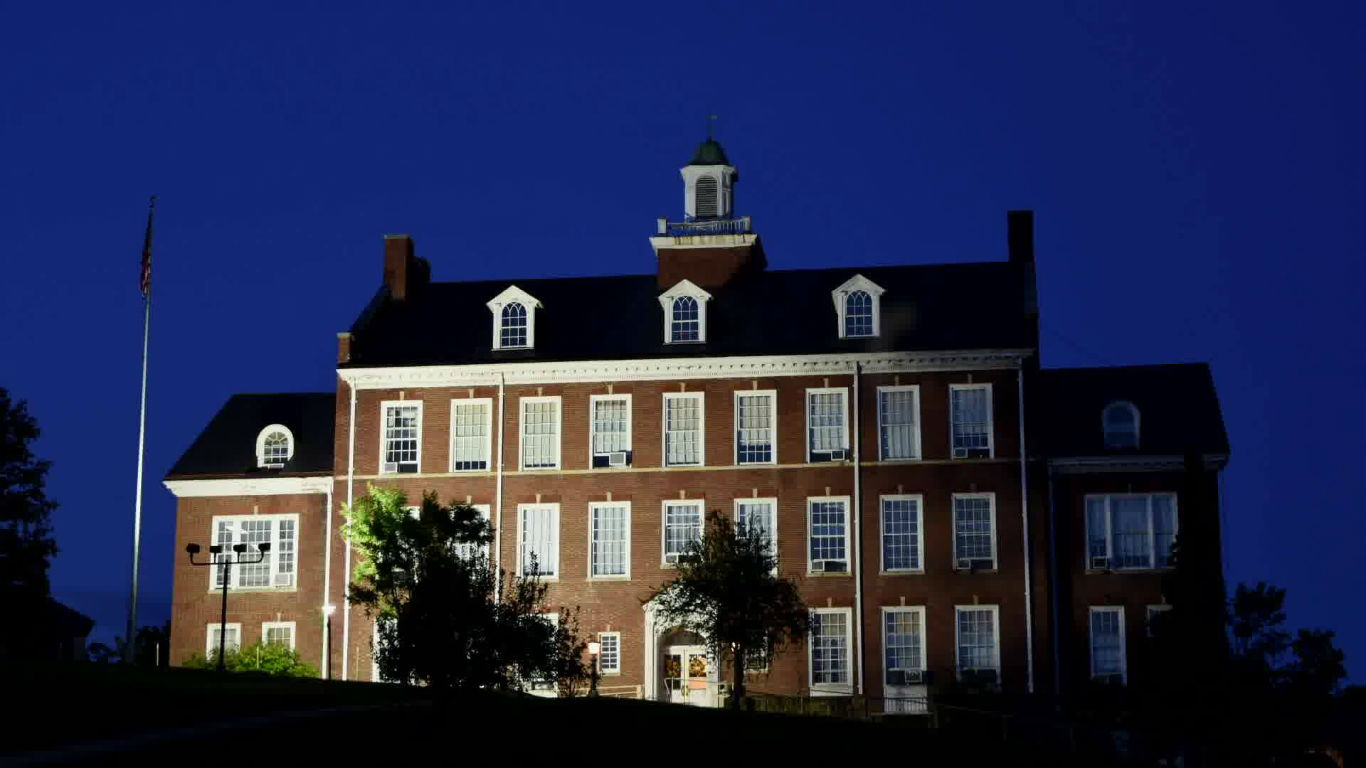
West Virginia: Davis & Elkins College
> Location: Elkins
> Acceptance rate for 2018-2019: 37.0%
> Applicants for 2018-2019: 2,495
> Median SAT score: 995 out of 1600
> Avg. annual cost of attendance: $40,551
> Four-year undergraduate enrollment, fall 2018: 756
Davis & Elkins College is a private institution of higher learning affiliated with the Presbyterian Church in Elkins, West Virginia, which is near the Maryland border. It is one of the smaller colleges on the list, with total undergraduate enrollment of 756 students.
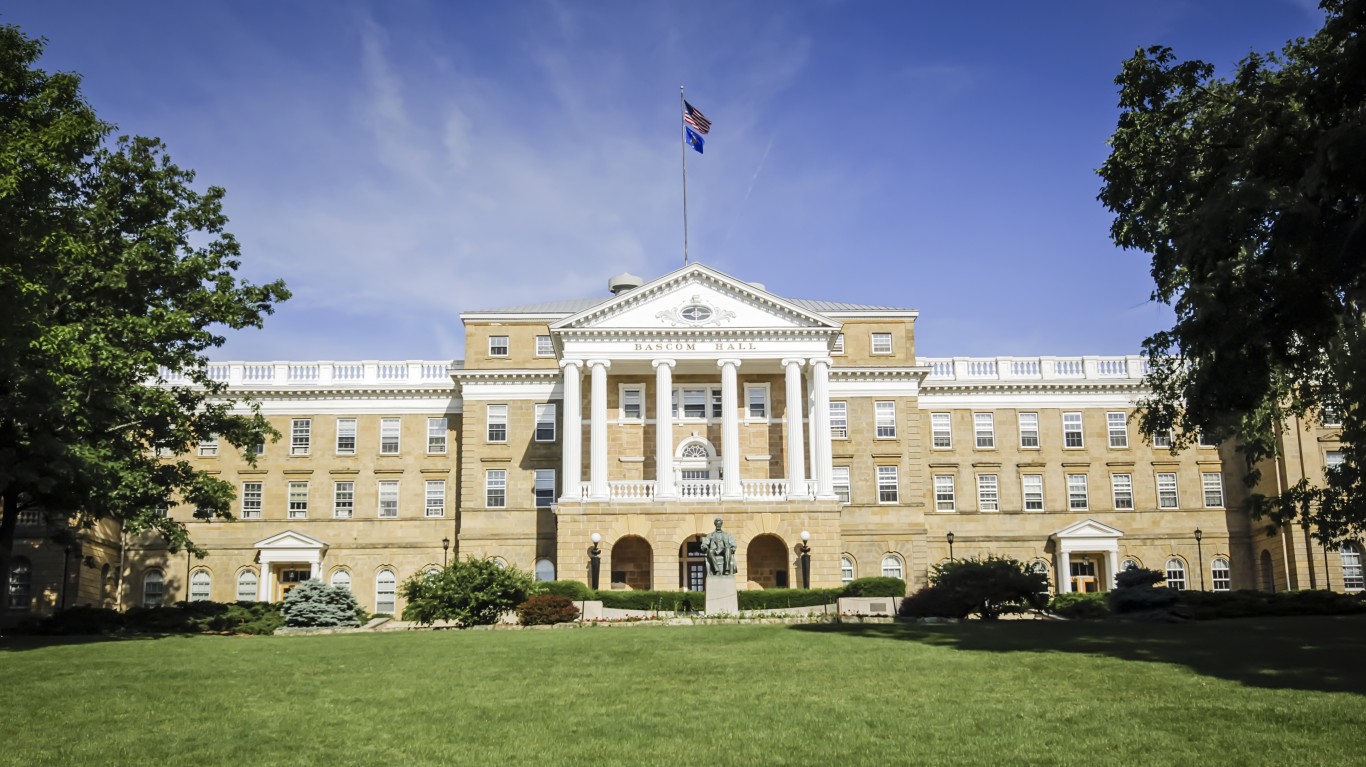
Wisconsin: University of Wisconsin-Madison
> Location: Madison
> Acceptance rate for 2018-2019: 51.7%
> Applicants for 2018-2019: 42,727
> Median SAT score: 1365 out of 1600
> Avg. annual cost of attendance: $25,497
> Four-year undergraduate enrollment, fall 2018: 30,360
University of Wisconsin-Madison’s children’s hospital was the site of the first bone marrow transplant in 1968. Twenty alumni have won a Nobel prize. Novelist Joyce Carol Oates, progressive politician Robert M. La Follette, and architect Frank Lloyd Wright are among the school’s alumni.
[in-text-ad-2]
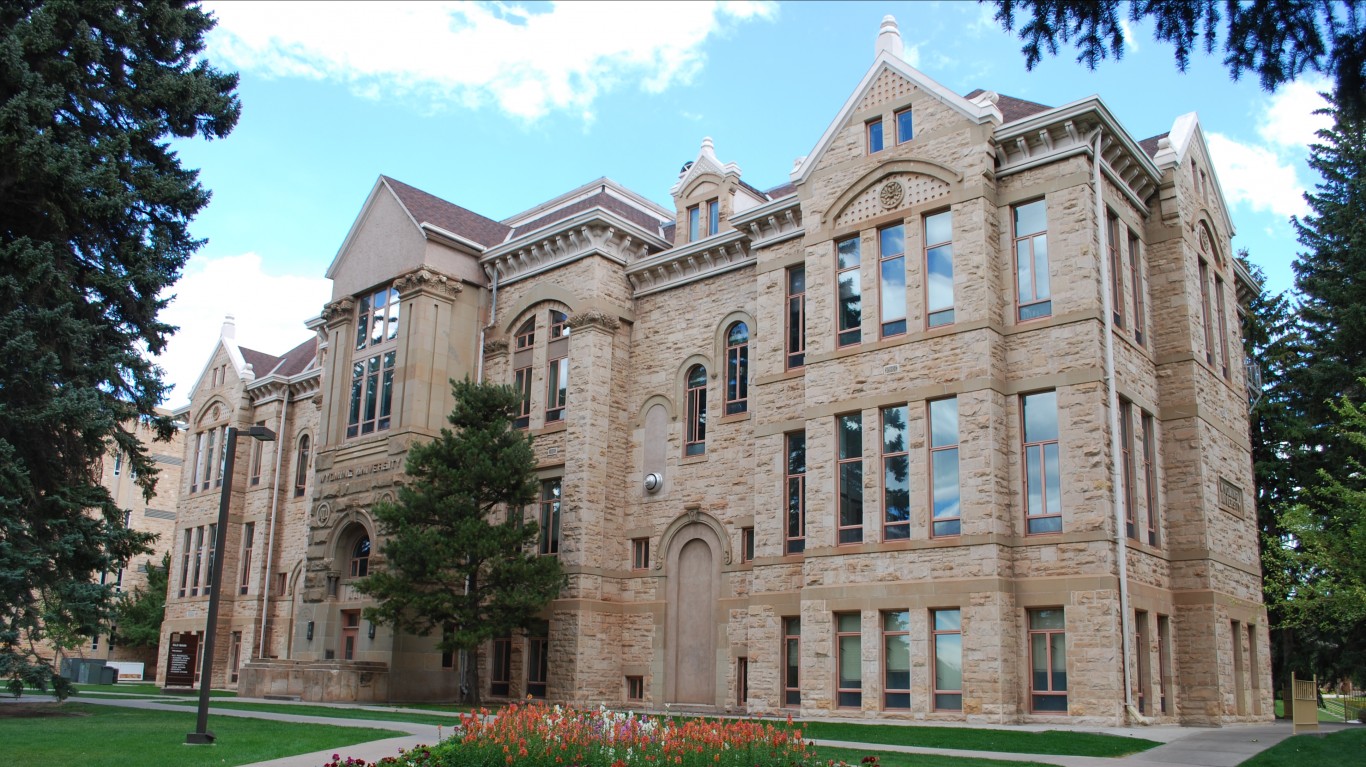
Wyoming: University of Wyoming
> Location: Laramie
> Acceptance rate for 2018-2019: 96.0%
> Applicants for 2018-2019: 5,293
> Median SAT score: 1165 out of 1600
> Avg. annual cost of attendance: $19,777
> Four-year undergraduate enrollment, fall 2018: 9,854
The University of Wyoming, founded in 1886, is located in Laramie and is situated between two mountain ranges. The school is the only four-year university in Wyoming, and at 96%, it has the highest acceptance rate on the list. Former Vice President Dick Cheney is a UW alumnus.
Methodology:
To determine the hardest colleges to get into by state, 24/7 Wall St. reviewed data on admissions and SAT scores from the National Center for Education Statistics of the U.S. Department of Education. Colleges and universities were ranked based on an index comprising admission rates for the 2018-2019 school year and the median combined math and critical reading SAT scores for students admitted in Fall 2018. Supplemental data on the average cost of attendance for the 2017-2018 school year also came from the NCES. Additional information was found in the Princeton Review as well as college websites.
We only considered predominantly bachelor’s degree-granting colleges and universities with at least 1,000 applicants. In two states, Wyoming and Alaska, there was only one school with at least 1,000 applicants, and so the school listed in each of those states was the hardest to get into by default. Enrollment figures are for all undergraduates, both full and part time, for fall 2018, also from NCES.
The last few years made people forget how much banks and CD’s can pay. Meanwhile, interest rates have spiked and many can afford to pay you much more, but most are keeping yields low and hoping you won’t notice.
But there is good news. To win qualified customers, some accounts are paying almost 10x the national average! That’s an incredible way to keep your money safe and earn more at the same time. Our top pick for high yield savings accounts includes other benefits as well. You can earn up to 3.80% with a Checking & Savings Account today Sign up and get up to $300 with direct deposit. No account fees. FDIC Insured.
Click here to see how much more you could be earning on your savings today. It takes just a few minutes to open an account to make your money work for you.
Thank you for reading! Have some feedback for us?
Contact the 24/7 Wall St. editorial team.